#but the logic they use to implement them is kind of flawed and/or they just. don’t utilize it the way they should
Explore tagged Tumblr posts
Note
how do you feel about where the boys is at? Any comments on like the quality of s1 vs s2 vs s3. What's like ur personal favorite (doesn't have to be like a critical masterpiece) and which character have u loved the development of the most
right now i feel like the boys is in a very tricky spot where it’s either going to go incredibly uphill and be restored or be completely fucked over by season 4. i’m not a huge fan of season 3’s writing, i feel like the direction it went with certain character arcs (coughcoughHughiecough) was kind of strange and could’ve been done WAAAAY better
my personal favorite will always be season 1 i think. peak hughie and i really enjoy how the story is built up (although my biggest issue 100% is how they handled hughie’s grief over robin. definitely not the best depiction of grief i’ve seen in a show)
honestly i’m not sure if any character’s development from s1 to s3 is very notable. it’s been a little bit since i’ve watched it so my memory is a tad foggy but the character with the most outstanding development to me is hughie’s. and god knows my feelings about how they did him in season 3 (the answer is not very good)
#the boys#hughie campbell#billy butcher#mother’s milk#frenchie#kimiko#the boys tv#text post#asks#send asks#i just. idk#hughies development so far has pissed me off n i hope that he gets straightened out next season#cuz rn hes just kind of an asshole with no real reason when he has so many reasons to be one#they couldve made the narrative push the idea that his grief and his constant surrounding of bad influence turned him into a piece of shit#but instead they just went with ‘haha its toxic masculinity lolz’ LIKE WHAT#WHAT HAPPENED TO THE MAN WHO WANTED TO BE BENCH PRESSED BY A PRETTY GIRL#idk. he just wasnt the right character to have a toxic masculinity arc imo#i notice this a lot with the boys#where they set up or they have these really good ideas for arcs#but the logic they use to implement them is kind of flawed and/or they just. don’t utilize it the way they should#the more i rewatch this show the more problems i find myself having with its writing#and this is coming from a place of love. i love this show and i enjoy watching it but it has so much potential to be so much more than what#it is currently. ykwim
20 notes
·
View notes
Text
★Trollsona★

Hello world and all who inhabit it! ( ╹▽╹ ). How are you all? I hope you're doing well. I know I brought you a post on Wednesday and all, but I still have more art to post that I made a LONG time ago before making this Tumblr account, so can you blame me for wanting to share it? After all, I've never really been able to show it to anyone. Only a select few friends, of which there are 3.
But anyway, today I decided to share another Trolls drawing, which is, you guessed it!, my very own Trollsona. (≧▽≦).
Her name is Moon Spectrum (same as my Wattpad profile, by the way), but you can call her Moon. She's a Rock Troll, although I couldn't tell you what kind of Rock she leans toward because I don't know much about the different subgenres of Rock, so. ╮(^▽^)╭. But hey, I don't think it matters much. As you could read in her fun facts, she's a radio host in Volcano Rock City with her own station, which she wants to expand to the other Troll tribes since the Rockapocalypse... which will be quite difficult, considering a good portion of the tribes don't have anything similar to Radio. Maybe the Funk Trolls, but there would still be trouble reaching the other tribes.
Anyway, she broadcasts her show late at night. Mainly because even before the tribes joined, she liked to share other types of music from time to time, which is why she could only do so at night, when almost all the Rock Trolls were asleep. The downside to this was that her station wasn't very popular, and only a very select audience of Trolls listened to it, who either stayed up late for various reasons or specifically wanted to listen to music of other genres. However, after the tribes merged, that select audience began to openly share the existence of her radio station, and little by little, it has gained recognition. So much so that she's been looking to expand to other places so she can share more music with other Trolls.
For Moon's design, I wanted to implement those concept art of Barb with bat wings, which I thought were really cool. The problem is that drawing wings is a bit of a chore, so yes, they came out awkward. (^~^;)ゞMainly because I made them big, but it turns out I like to follow a certain logic, and smaller wings didn't quite convince me that my girl could fly comfortably (although you would have also had to consider her hair, which seems like a bit of a hindrance when you think about it), so I ended up making them bigger. I also didn't like her clothes very much here, as I was looking for something that would fit a winged creature. I also had some trouble choosing her color palette, as I didn't know how to color her skin in general and her wings, but I think it turned out pretty well for her first design. (;^ω^).
Although I did take the liberty of changing some things about her when I made a collab with a friend, which would be this drawing:

Here I changed the design of the wings, clothes, and bangs in some parts. I also added details like hands and feet with claws. The wings didn't quite work out in the end, and the bangs didn't turn out as great as the first version, but I really liked the outfit. And yes, the logo on her shirt is the name of her radio station: "Rockstar Radio" (nothing to do with Rockstar Games, XD. I just thought it would be a cool name).
The pose also has flaws, especially where Moon is holding Lyxn. And by the way, yes, that little Troll is Lyxn, my friend's Trollsona. ಡ ͜ ʖ ಡ. She made her own design and sent it to me so I could do this drawing, although I didn't end up shading it. But it still turned out cute, according to us.
The story of how Moon and Lyxn met is this: it was at the first annual gift exchange organized by Queen Poppy. Lyxn was a Pop Troll dabbling in Hip Hop who'd been told about Rockstar Radio, so she started listening. She liked the content Moon had to offer, and when Poppy gave everyone an invitation to the gift exchange, Lyxn got Moon's name. So she drew a picture for her to give her!
However, she couldn't wait until the night of the exchange, so she traveled to Volcano Rock City on her own to deliver the picture right away. How did such a young Troll get there? No one is really sure. The only thing Moon knew when she found Lyxn hanging around her broadcast booth was that she spawned in a box (according to the interns) and escaped before they could catch her. More than just annoyed, Moon was worried about an underage girl being so far from home so late at night, so she decided to take her home herself. But not before receiving the gift of Lyxn.
Moon really liked it, and they've become good friends ever since.
And well, that's all for now. I hope you like it! (ノ◕ヮ◕)ノ*.✧. I know Moon doesn't have the best designs, but I'll try to make improvements if I draw her again next time. Especially on the wings. I want her to keep them, but I'm still not entirely sure how to get to a design I like.
Anyway, thanks for reading!
#art#dreamworks trolls#original art#pop trolls#rock trolls#art collab#trolls oc#trollsona#trolls original character#trolls world tour
13 notes
·
View notes
Text
Reranking Chapter 4 of TCC!
About a month after I watched Chapter 4, I ranked all the episodes in Discord! And it's crazy to say that my opinions have changed DRASTICALLY since then. So, thought I'd share them here!
Ranked last to first, hear me out! None of the episodes are bad, and all of them are better than most episodes in the previous chapters, in my opinion.
E1- The Spider’s Stolen Silk- First episode... last place. This episode was in last place when I watched it in January. And it remains so. It’s just that there’s nothing special that stands out to me. And I don’t get the moral of the episode- art doesn’t always have to be useful. It’s… sigh, I had such high expectations for the first episode of the season… Pierre was kind of fun though.
E8- The Vanishing Of Mr. Blue- Wow, this one has spiraled from fourth all the way to second LAST. And I don’t think I need to explain myself. The idea was good, but they could have executed it WAY better. However, Kit and Sam’s banter and the start and end was really funny.
E7- The Mysterious Swamp Rats- Not a very special episode… I’d say it’s pretty weak. Call me biased, but I DESPISE when they use the CLADE Claw to bail out of a situation. Apart from that, it was fun- Kit losing everything, the cute lil’ opossums, the FREAKING OUT of all the animals at the beginning- pretty good!
E2- The Mystery of The Snow Maze- It’s called the Mystery of the Snow Maze… and they didn’t even spend FIVE MINUTES IN THERE. I wanted to know more about the cave! Not outside! Sam has an absolute trash sense of direction though- pretty in character. Wally Bungler was a joy to see again!
E4- The Case of The Talking Tree- WE SEE THEIR BEDROOMS! :DDD There’s a reason I made a gigantic post just YAPPING about them! Moving on to the actual episode, I may be biased, but I LOVE night-time mysteries. They just feel more mysterious and eerie. The cricket was actually pretty interesting, and so were the other shenanigans in that episode.
E3- The Case of The Stinky Swamp- Insane how this used to be second last. Because I’ve grown to appreciate it much more! After a long time of teasing Sam for not liking stuff… oh, how the tables turned. It was an absolute JOY to see the stinkwells again! And they played their roles exceptionally well. And we finally see just how mad Kit gets when you push her buttons right. Overall, great episode, and keep being awesome, Stinkwells!
E5- The Trail of the Tuatara- What was once first…. Has descended way far behind. I still love this episode, and Tony! SAM HAVING A INSPECTOR GECKO MUG? <33 But yeah, the overall case… didn’t serve all of my expectations. It could have gone a lot more better. Cubby making an appearance though? :D
E10- The Hidden Hitchhiker- Wow. When I first watched the series, I chided it for being extremely unrealistic. Which it still is. But the more I watch it, the more I kind of.. excuse it in favour of the absolute gold that is SNOWCASE. It still has its flaws because of the overall conflict, but take away logic? It’s an amazing episode with high stakes and great comedy.
E9- The Bat That Couldn’t Remember- An amazing episode. Once once was third has moved up to second, because I’ve grown to appreciate the cuteness that is NIMBA! She’s so adorable and fun, and the part when she falls down the mountain (and Sam and Kit were going to CRY if she didn’t get back up?) Perfection. Other niche things about Kit just putting sticky notes everywhere, Sam boasting about things to hide his insecurities as normal, Kit being excited to find a new species, ALL OF IT! A really amazing episode that deserves second.
E6- The Disaster At The Dust Spa- AND FINALLY! This was placed really high last time, and now it’s first! I LOVED this one. Sam given the trait of being excessive about his appearance, (and Kit not caring at all) the CHINCHILLAS, the concept of the Dust Spa, (I love it when TCC implements human aspects to existing animal behaviors) Sheila just being a simp for Sam, Him practically putting himself in danger to protect her, Kit’s stuff outside the spa, EVERYTHING! Just a really, really great episode out of all ten good ones.
Well, those are all my opinions! Do let me know what you think :D
5 notes
·
View notes
Text
Controls Systems Suck
This is just a compilation of a very long thread I made on Mastodon so I can share this better. For more context, this is all in reference to my replies to Soatok's ongoing responses to the Matrix dev team re: Soatok's responsible disclosure of security flaws. The TL;DR is Matrix was using an educational implementation of a thing, that explicitly said to not use it in production, and didn't do anything about that for seven years until Soatok found it. Here's a link to my first of the reply chain directly talking about that here: https://furry.engineer/@senil888/112964632462775370
This is why I think the way I do, and why I ultimately distrust the Matrix team and will distrust anyone who behaves similarly. This is 100% copy-paste from my long thread, so it's clunky.
Someone remind me tomorrow morning to talk about the dam project I worked on so I can discuss some of the bullshit that happened there that we could never test in the office, but why what we were able to test still let everything surrounding the bullshit run smoothly enough. Because oh boy there is a lot to talk about. The field I work in leads to all sorts of weird shit that you will never expect until you go on site. I'm kind of surprised some if it worked as well as it did.
never mind I can't fall asleep so you're getting some of it now.
so. The main project I had with my (now former) company in my short time there was for a hydro dam up in the Idaho panhandle. Literally in "Boundary County" lol. That's not important though.
What is important is that this hydro dam - a small one, maybe outputs 4 megawatts during peak spring runoff - helps power the nearby towns via the city-run utility. While it's not the end of the world for the dam to be offline, them being offline means the utility has to buy even more power than if it was running.
Which costs the city a fair bit more money than running the dam themselves, because you have the power generation places that need their money to run their facilities, the transmission companies that need to fund their projects...
So, it's pretty important to help them get back on their feet. And we had a big task - we were to replace their old Allen-Bradley PLCs with our own, and toss in a SCADA system too.
The SCADA system is fairly straightforward when it comes to data inputs - I could just take the data, label it, maybe do some conversions as-needed, and toss it up the chain. For this system, it went generator-connected PLCs to a beefier PLC running more sophisticated software as well as a basic HMI, up to the control house computer that ran a Zenon HMI we developed as well.
The hard part comes in when we actually add in the controls. Which is, y'know, important since we're replacing everything their old PLCs did with our own system and solution. Which meant we needed reference code, since the customer knows their system the best (mostly, we talked with the operators who knew how to run the thing, but didn't 100% know the backbones).
What we got? Was in ladder logic. Which looks very different to structured text, aka what you think of when I say "what does a programming language look like typed out?" So... not only did we need to re-create that, we had to "translate" it into ST as well. Fun!
This is where the controls joy comes in. Each PLC acts mostly the same when it comes to general operations. These outputs are for lights, this output needs to do this thing and get this signal for some time back before another thing can even think about asserting, etc.
Spinning up a hydro generator takes a decent bit of time. Not forever mind you, but there's a lot of steps involved. First you need to get water to, y'know, the thing itself. But you can't just send water straight from the turbine inlet valve (TIV) to the turbines. You need to balance the water pressures between everything because if you don't? Congratulations you just broke the turbine and this generator has to be rebuilt.
Once the TIV bypass does its thing for a while, we can actually open the TIV and start to send water to the turbine. Once water is getting to the turbine, we open up the wicket gates which actually finally let water to the turbines. They're controllable, so we can define exactly how much water gets to flow.
Then it's the usual generator stuff. Get the thing up to speed and, once it's up to speed and stays there for a little while, ya gotta sync the generator phases and frequency to the grid phases and frequency. If the phase angles are off too much, you end up kicking the generator forwards or backwards when the breaker closes to the grid.
That can be... you know... a little violent. So we need that to be as precise as possible, and to close as soon as we're confident it'll safely kick in without breaking anything. So that's the gist of the start-up sequence at the dam. However.
There's a bit of a fail over system with the Zenon HMI. See, the two powerhouse PLCs gather all available data in this system as a form of redundancy. This is fine when it comes to inputs, but again we run into problems with outputs. Zenon can only fully connect with one of the PLCs at a time.
Unfortunately... it's possible for a switchover between the powerhouse PLCs to happen when an operator is trying to send a command.
The absolute last thing we need is for a command to be sent twice during this switchover, because data might not be 100% shared between the two. Some data does only go to one of the powerhouse PLCs, which means the other one is totally clueless as to what that device is up.
Our first main problem was fixing this control switchover problem, brought upon the very nature of our design scheme and how Zenon works (which I think they've fixed but I never worked on Zenon myself). Again, we have to account for every possible problem which means figuring out how to make sure a command sent from Zenon "syncs" between devices, since Zenon also controls analog outputs as well. Digitals are fine and easy, but analogs have to be preserved.
I had set up a... bit of a clunky solution, but ultimately it worked and kept that data in sync. One major problem resolved. Of course, this is the real world still, so a problem came up again. There wasn't anything we could do, but our system working as it should let us test it.
What ended up happening was one generator - which was being rebuilt and some different sensors were added - wouldn't report how far the wicket gates were open. This is obviously bad, because now we have no idea if those things are opened, and we can't act on it anymore.
The sensor was a hall effect one, made of steel. There is a window above it. This is a dam, close to the river and a waterfall. I hope you can guess what the problem is. Hint, it involves steel not liking moisture. We cleaned out a COPIOUS amount of rust, and hey look the sensor was finally working again, we got wicket gate data. So we could finally spin up this generator. Which we were able to do...
Except, y'know. Problem time. The generator was vibrating, and vibrating a LOT. Consistently. Every time it started up, a piece of logic I had adapted would run through and trigger an emergency stop. It basically monitoring vibration data, and if ANY input measured over some threshold for more than a few seconds? E-stop time.
So something is still wrong with this generator. We trust the sensors since we're getting good data as the generator spins up, it just... shakes too much. We actually temporarily disabled the logic that trips the generator to monitor its behavior if it didn't e-stop in time.
It kept vibrating, more and more. It would probably shake itself apart if you let it keep going. It also did it consistently, and it was one bearing's sensor that was consistently tripping. (aside: that bearing had also seized up TWICE during prior trips to commission this generator. It also did it again after we left the site)
The only reason we were able to check this case is because what I had written worked and we knew it worked. In part because that same logic was on three other generators, but we were able to accidentally prove that hey, if this happens it'll work.
It turned out the people rebuilding the generator didn't balance the flywheel when they fixed the bearing before, so oops! You can't spin that thing up just yet.
Imagine how bad this whole thing could've been if we weren't as rigorous as we were. Generators could've broken apart. People could've been hurt. Expensive equipment could've gotten seriously damaged. Hell, it might not even have started up because of how much other equipment we had to interface with that we couldn't investigate ourselves.
That client trusted us to get their dam up and running with new hardware that would treat them well for many years to come, and to build a partnership with a firm they could trust. In the end, we delivered and they're supposedly working on more (smaller) projects with them.
I don't know the specifics, but BECAUSE we were persistent in making sure every edge case we could think of was resolved, and fixing everything in real-time as problems came up (and making sure our fixes wouldn't introduce NEW problems)... we were able to tell them "you can trust us." Because ultimately, "n one is obligated to buy from you. You can go out of business tomorrow if everyone decides to never work with you."
It's largely because of my experience with the hydro project that I just can't trust companies, projects, and teams that hide vulnerabilities and failure points and hope nobody finds them. It makes me question how many they actually have hidden when someone does find one.
How many defects does their thing have, if some of the most obvious ones are let through? If this obvious error got through their QA checks, what else is lying under the hood that we don't know about yet? Can I trust this system to be robust enough in the event of a catastrophic failure?
I know cryptography and E2EE in particular aren't remotely comparable to what I've worked on... but what I've worked on is super important. Lives are at stake with these projects. I need to be confident that what I do isn't going to hurt people. Isn't going to break equipment. Isn't going to fail in two years because of an oversight.
I need projects in critical fields that take themselves seriously to ACT like lives are at stake, because maybe some are.
I know this is a giant thread that I'll probably compress into a tumblr post so it's easier to share, but I just. Need to finish with a final thought.
I know lives aren't at stake in a lot of places. But if you're taking yourself seriously, in something as important as cryptography, something that is increasingly important every single day in every field - critical infrastructure included - you need to act like lives are at stake if you fuck up.
I know some of this shit is just a chat protocol, "why are you so pressed" blah blah blah. A lot of people herald E2EE services as a secure way to also talk about protests and labor organization without significant risk of getting caught. Of course, if you don't regularly use E2EE normally the fact you use it might implicate you.
When it comes to organizing? If a court requests data from some service, as little data as possible should be sent out. Because people get jailed or imprisoned for organizing. Those lives are on the line if your system isn't up to snuff.
This isn't to say "just pick any E2EE service it's fine" because it's not fine to do that. People need a service they can trust, that's reliable, that takes security seriously and does everything in their power to make sure what they do is as secure as possible. From what they know is a fail point, and what they later find out is a new possible fail point.
People need services they can trust that has their best interests in mind. Clients need businesses they can trust that can hold up their end of the contract and deliver a quality solution that fits their client's needs.
Why should anything like this be any different?
EDIT: I wanted to add something else I added.
People die when we fuck up in this industry. We can't allow that to happen, ever. Our trust is built upon proving a track record of quality work done timely. Work that stands the test of time as systems operate. I know a lot of shit is nothing compared to critical infrastructure, but I wish more folks took it remotely as seriously as people in my industry have to. Because if we fuck up, people get hurt. People lose power. Facilities get damaged. Industry stops.
Everything today revolves around power. If the power goes out... so does everything else.
0 notes
Text
Edelgard and “meritocracy” - an essay
In this essay I wish to adress the common argument that “meritocracy bad, therefore edelgard bad” & the logical leaps therein.
Before we begin, I’d like to stress that she doesn’t even use the word “meritocracy” & they’re not even looking at it’s modern definition but reacting to the way it has been used as a fighting word to denigrate the poor specificically in the post reagan modern USA & then assuming Edelgard means the exact same thing by that without bothering to examine what she actually says & in what context.
Modern capitalism & the way it uses rhetoric of merit as an excuse is bad & with its reduction of human value to their moneymaking ability, definitely inherently ableist, I agree totally.
But 3H does NOT take place in the modern world. Progress is always relative to what came before. It*s progress away from entrenched problems.
It’s a total failure to even imagine a world different from the sucky one we live in - that’s exactly what tolkien meant by that saying that if we’re prisoners we have a duty to escape.
Edelgard doesn’t live in a capitalist society nor is she bringing about capitalism (if anything Claude’s the one talking of free trade & giving the merchants what they want, though he is almost certainly playing them much like the church)
And the main component of capitalism - factory owners, rich elites who owns large swathes of companies or real estate - is nowhere to be found.
In our world that cropped up because industrialization made owning factories, offices, trade etc. more lucrative that just owning the land, so factory owners replaced landed lords, essentially promising the peasants freedom if they helped them overthrow the kings but granting them only in a limited manner - the flawed inequal democracies that resulted were a compromise between peasants and factory owners.
But by and large the nobles are very much in the same niche as the factory owners today - they own the land and get special trade privileges (the means of production), they often abuse the populace with impunity, the peasants are very poor.
Edelgard cracks down on corruption & special trade privileges even during the timeskip.
And like the rich of our world, they have a self-mythology propaganda justification based on merit. Yes, there is the “by the grace of god” argument, too, but crests give you extra fighting power, and if you look at the Ferdinand support for example you do see that Fodlan’s nobles - especially the adrestian ones - see themselves as a honed elite that is trained from birth & therefore better at ruling.
Not quite the same argument a modern billionaire uses - who is very invested in convincing you that they didn’t get their power and wealth by their birth - but a myth nonetheless.
Edelgard’s not bringing “meritocracy” as in brutal competition opposed to caring social safety nets, but as opposed to unearned privilege.
If you wanted to compare that to any kind of sociohistorical context, you might look at Napoleon’s peasant liberation or the implementation of civil service examinations in ancient China.
That wasn’t an all good thing - In the same way that Europe is very impacted by the legacy of rome both good & bad (there are persisting bad attitudes toward war, authority and agriculture for example), east asia still has a lot of education obsession causing pressure & unhealthy work habits to this day.
But if you compared ancient china before the reforms to ancient China after it definitely got better, by ancient china standards.
We couldn’t expect the people back then to come up with all advances up to our exact modern values at once (not can we be sure how much of our values will stand the test of time)
Considering that Fodlan’s ideal of merit is basically what Lorenz, Ingrid and Ferdinand are embodying for their respective countries, and that she stocks her inner circle with very different leaders, it is no stretch to say that she wants to shake up the social ideas of what even counts as merit, to make ppl value other things that crest power or elite upbringing, the same way we might say today that hey, cleaners are valuable actually.
Edelgard is basically doing her world’s equivalent of taxing the billionaires - reducing the power of what the overprivilieged class happens to be, & it’s obvious from her talk of how she despises inequality that she would hardly be for rule of factory owners.
When Edelgard says that she wants to make Fodlan more merit-based, that has to be taken in the context that she lives in a world where your birth determines everything, incompetent nobles can be as lazy as they want, and no one cares how competent you are if you lack a crest, title or both.
If she looked at our world, she would quickly see through the propaganda that it is supposedly “merit based” and object to how wealth and national origin obviously dictate wealth & opportunity while talented people go to waste in sweatshops.
Now of course there have been arguments even against “perfect” meritocracy - one is the devaluation of working class jobs.
To this one could answer that this is more a flaw in how merit is conceived. Historically there have been societies that exahlted blue collar work, artisans or farming.
The second argument, however, is not so easy to get rid of: That is devalues people who can’t just go & produce like machines, especially the unemployed, the sick, the mentally ill, the disabled…
But at this point we’ve got to lean back & get our definitions straight, & make it clear what we even mean by “meritocracy” -
Because if we’re just talking about the basic idea that competency should be rewarded, I don’t think too many people disagree with that. We might see a problem with valueing the competency of a doctor or lawyers dispropottionally over the competency of a cleaner or a bricklayer, but we all, by and large, want the people who prepare our goods and services to be competent. Maybe we wouldn’t exalt it over all over qualities, but most of us admire skill.
Of course the problem with the political rhetoric of “meritocracy” is that it goes beyond just rewarding skill, first with the afore mentioned rewarding of only some skills, but mostly with the reversion or overemphasis of the above: Saying that skill is the only thing that matters (to the exclusion of any inheent human value) & that those who don’t have it are worthless.
First I want to throw out the thought that this is a product of the production/profit orientation of capitalism, but one could of course imagine, as many sci fi authors have done, a non-capitalistic society that is still obsessed with merit at the exclusion of those who are not oriented towards productivity & care more about fun & relationships than producing, or those who can’t produce because they are sick or disabled.
So now we must ask ourselves the question: Which of those views does Edelgard actually hold?
Cause I want you to notice that they’re not the same. “Skill should be rewarded & jobs should be done by competent people” is not the same position as “Skill is the ONLY thing that matters and if you don’t have it you are worthless”
In one position, skill is a good quality, in the other, it's a prerequisite to worth.
Most of us here probably agree that skill is admirable (we like and reblog pretty fanarts), but not that the unskilled are worthless.
Looking at her superficially I could perhaps see how someone might suspect her of the latter - She gravitates to & surrounds herself with skilled intelligent people and she’s obscenely superpowered.
It’s an misunderstanding that Dimitri makes in-universe, he accuses her of “only benefitting the strong”
But note that her answer to that is that she wants to empower the weak to no longer be weak & decide their own lives, instead of accepting charity. (Contrast with how Dimitri romanticizes abyss, for example, even as Claude points out that locking the poor underground is hardly help.)
Of course she can say many things, as rulers often give florid speeches.
But let’s have a look at what she actually thinks. How does edelgard actually act towards people who struggle or aren’t productivity oriented?
This is one of her lecture questions from part I:
“When one professor lectures many students, some will inevitably have trouble keeping up, while others will get too far ahead in their studies. I wonder how this problem might be solved…”
Her favorite answer is “lectures should be optional”.
Which part of that sounds like a bell curve type eugenicist “only skill & intelligence counts” kind of person? She wants the struggling students to be taken proper care of, not just the good ones.
Look at the speeches she gives to Petra & Lysithea about not giving up on themselves & wanting them to move forward from an empowered mindset. Look at how she tells Lysithea to take it easy & not overtax her body. (Not "don't whine & keep working")
Look at Bernadetta - very much an ‘unproductive’ individual with great struggles & limitation. Does Edelgard dismiss her as a weakling? Not at all. Not even in the C support. She makes sure to stress her good qualities when introducing her, makes an effort to be more patient so as not to scare her, & they become good friends.
Look at the Linhardt support - at first she mistakes his behavior for youthful lazyness (He’s 16 after all) & wants to get him to apply himself, but when she realizes that he just has different priorities, she respects that, & works to get him the exact sort of position that he wants. No “suck it up!” or dismissing such a different lifestyle. Nor does she chide him for hating fighting at any point.
Edelgard does everything in her power to accomodate people so they can do their best. She sees the value even in strange unsocial people that society would dismiss. She found a job for someone like Jeritza & helped him, she doesn’t hesitate to make Dorothea a general or Manuela the prime minister no matter what people say or if they don’t act like typical politicians.
Also, when she talks about choosing her sucessor, she wants them to be brilliant/competent yes, but also kind and 'an outsider' (ie, impartial) - hardly a PoV of "if you are skilled you can do whatever you want and if you aren't no other quality matters". She's prizing kindness & objectivity just as highly, something which is absolutely reflected throughout all her actions & behaviors towards others.
She doesn't devalue living quietly & low key without making waves - in fact, that is her dream life, which she deems superior to achievement and ambition, which are to her just tools to archieve good aims.
She couldn’t be further from having a narrow definition of what a “valuable” person is, she is all ABOUT empowering people to take control of their own lives, no pity-driven charity, no paternalism, none of that. This is one of my favorite traits about her, so I can’t help but get mad when people accuse her of being the exact opposite.
But maybe the biggest argument is abyss. This is where the genuine underclass lives, poor, struggling, traumatized, refugees etc.
Edelgard isn’t as vocal during Cindered Shadows as Claude - she can’t blow her cover & just isn’t as expressive personality wise. But she’s the one who makes everybody swear to take care of Abyss no matter who wins.
And her route is the one where, instead of telling you that they lost people, Hapi tells you that they’ve all been pretty much fine over the timeskip.
If you want to help the struggling & the poor and those who don't have "conventional" skills, you should back edelgard.
#edelgard#edelgard von hresvelg#three houses#fire emblem: three houses#fire emblem three houses#fe3h
238 notes
·
View notes
Text
Device-Independent Quantum Key Distribution (DIQKD) - a Provider of Secure Communication? Part I

The flourishing field of quantum cryptography might have its roots in the 1980s, approximately when the BB84 protocol was published. While this protocol makes use of quantum 'peculiarities' and provides a way of distributing secret keys between two parties, Alice and Bob; it has been possible to prove its security. In particular the latter point is a decisive advancement in comparison to classical cryptography such as commonly used RSA encryption: the security of classical cryptography is most often based on our trust that technological advancements are a slow process. If there was a large and rapid leap forward in terms of computational power, encryption methods that can be broken via prime factoring, e.g. RSA, would lose their security instantly. Hence, quantum key distribution (QKD) is a promising attempt to provide secure communication: its security is not based on 'naive' confidence in slowness of technological advances, instead it is based on fundamental laws of nature. Quantum mechanics itself provides ways to keep Alice and Bob safe from an eavesdropper, Eve.
Limits of provable security
However, the provable security of QKD only works in theory. As usual the devil lies in the details, hence in the assumptions of such proofs: usually, they do not take into account that the practical implementation of QKD protocols relies on real, flawed devices. Unfortunately, this crucially undermines the practical security of QKD in real life applications. Even commercial QKD systems have been hacked in the past [1]. Research groups such as Vadim Makarov’s Quantum Hacking Lab focus on work of this kind. Thus, the dream of secure communication via quantum mechanics seems to be in danger. The possibility of hacking QKD motivates to develop specific countermeasures and/or new protocols that cannot fall prey to eavesdroppers. Among these new developments one can find the attempt of Device-Independent QKD (DIQKD), that tries to tackle security issues of quantum cryptography in a structural manner.
Key idea of DIQKD protocols
Facing the issue of imperfect devices, one can imagine that the manufacturer of the devices might be identified as Eve with malicious intentions. To be less dramatic and paranoid, the manufacturer might be just careless such that the devices do not work properly, hence causing a lack of security during the key distribution. However, given the possible imperfect/malicious devices makes it necessary to implement some kind of 'self-testing' into the protocol. The key idea of DIQKD protocols is to make use of Bell inequalities, such that the protocol can be aborted if the necessary degree of 'quantumness' is not achieved in a run of the protocol. Creating keys this way requires playing games such as the following Clauser-Horne-Shimony-Holt game (CHSH-game) [2]:

The encircled plus denotes binary addition (XOR) and the "·" is basically equivalent to a logical AND. The probability (A derivation of these probabilities can be found e.g. in these lecture notes: [3]) of the winning condition of the last line is 75% for a classical device, i.e. if there is no entanglement. Whereas under the usage of maximally entangled states (e.g. the Φ^+ Bell state) the maximal winning probability can be 86%. As a result, Alice and Bob do not need to trust the devices, they can test their reliability by themselfes via checking the correlations using their public channel. Hence, DIQKD protocols do not rely on specifying the internal functionality of the devices. The fact that this self-testing is reliable is based on monogamy of entanglement - a feature of quantum entanglement that ensures that a bipartite state cannot share any of its entanglement with a third system, i.e. in our case Eve. Thus, since Bob and Alice can test whether there is a maximally entangled state shared between both of them, they can be simultaneously sure that Eve cannot obtain information about their shared state.
DIQKD protocols work like the following in principle (see for a similar example e.g. Box 1 in [2]): Both, Alice and Bob possess a device in each of their isolated laboratories such that they can play the CHSH-game. The index i denotes the round in the interval [1,n]. For every round they perform the subsequent steps:
Both parties choose their setting x_i, y_i randomly.
They actually input the settings and record their outputs a_i, b_i.
They share the inputs and outputs of a sufficiently small subset of rounds such that they can test the "quantumness" and abort the process in case the winning probability is too low.
If the "quantumness" is satisfying, they do the usual QKD post processing (as in the BB84 protocol) with the bits of the remaining rounds, i.e. error correction, key sifting, privacy amplification and finally, they successfully distributed a key.
Is such a distributed key necessarily safe in practice? The security of protocols of this kind has been proven mathematically as for the BB84 protocol, but might it be reasonable to expect backdoors that arise once such protocols will be actually practically implemented? We will discuss this question in an upcoming part.
---
[1] Lars Lydersen et al. “Hacking commercial quantum cryptography systems by tailored bright illumination”. In: Nature Photonics 4.10 (Oct. 2010), pp. 686–689. doi: 10.1038/nphoton.2010.214. arXiv: 1008.4593 [quant-ph].
[2] Rotem Arnon-Friedman et al. “Practical device-independent quantum cryptography via entropy accumulation”. In: Nature Communications 9.1 (Jan. 2018). doi: 10.1038/s41467-017-02307-4. url: https:doi.org/10.1038/s41467-017-02307-4.
[3] Ihttp://markwilde.com/teaching/2015-fall-qit/lectures/lecture-06.pd
#mysteriousquantumphysics#quantum communication#quantum#quantum mechanics#bb84#physics#studyblr#physicsblr#stemblr#quantum science#cryptography#quantum cryptography#quantum physics
65 notes
·
View notes
Note
Hey, I'm wondering if you have any advice on writing kink stuff? Basically, it feels like I'm writing the same story repeatedly. Coming up with stuffing scenarios that both make sense, and aren't just retreads, is really hard. It probably doesn't help that a) I don't have much writing experience, b) my interests are really narrow, and c) I have no imagination, lol. How do you keep stuff fun and interesting? (Jsyk, I sent this to Tiny as well, I love both your blogs 😊)
Hey, anon! Thank you so much, I’m so glad you enjoy my and Tiny’s content and I’m flattered to be asked for advice! ♡ I have a lot of thoughts about this, so I’ll do my best to boil them down into something useful.
^^
Since you mentioned being pretty new to writing, I broke up my advice into a few different “stages,” starting with things that are easy to implement and moving to things that might feel more manageable as you get more comfortable with writing. Under a cut because Real Heckin Long.
Stage One — Don’t Sweat It
This might sound corny and unhelpful, but I genuinely think that especially when you’re first starting out, it’s best not to put pressure on yourself to write the world’s most original stories. Write to please your inner fiend and nobody else! If repeated versions of the same story continue to light your fire, there’s no shame in embracing that.
Doing this will honestly help you with originality in the long-term anyway, because you’re giving yourself the freedom to learn more about what specifics you really enjoy in kink writing. Later on, you can use that knowledge to put new twists on those specifics and invent new scenarios.
Stage Two — Stuffing Scenario Cheat Sheet
I completely agree that believable stuffing scenarios are really difficult to invent. What’s realistic is a matter of opinion of course, but for me, this is a quick breakdown of logical reasons for a character to overeat. If you’re getting tired of using the same justification in your fics, try picking something new from this list:
Accidental stuffing:
Character is distracted by something during the meal
Character eats so fast they don’t realize when they’re full
Character has been hungry for awhile and overdoes it when they finally get to eat
Reluctant intentional stuffing (motivated by external circumstances):
Character feels social pressure to keep eating **
The food will go to waste otherwise **
Eating contests / challenges **
The character is trying to bulk up
Enthusiastic intentional stuffing (because the character wants to):
Character just enjoys the feeling of being full
Character and/or their partner(s) have a stuffing kink
Character has temporary access to good food and is indulging while they can
Fantasy Shenanigans:
Side effects of being a magical creature (e.g. a werewolf eating too much for their human form to handle, a vampire needing to feed all at once, etc.)
Magic that causes a character to overeat (e.g. enchanted food, curses, potions, etc.)
Magic that requires a full stomach and/or extra energy to work (e.g. my di-mage spell mechanics, the antidote in this fic of Tiny’s, etc.)
[free space because fantasy lets you set the boundaries of what’s realistic, so your imagination is really the limit!]
** If you’re aiming for realism, I would be careful of these scenarios. In my opinion, they can be done believably, but often are not. Some things I would look out for:
Most foods can easily be stored for later, so if you want to use the “avoiding waste” trope, make sure that you’re either in a setting without access to refrigeration or that the food is something that genuinely wouldn’t keep until the next day (or at least would be way less tasty after a night in the fridge.)
Social pressure works best in scenarios with people that the to-be-stuffed character 1) doesn’t know very well and 2) wants to impress or keep face around (e.g. formal events, business dinners, first dates that involve food, meeting their partner’s family, etc.)
Loving friends, family, and partners don’t pressure or guilt people into overeating! Characters stuffing themselves because their loved ones are really insistent that they have to taste-test everything or act so disappointed because they went to all this work on some extravagant feast always ring at best false and at worst abusive to me. What kind of loving relationship is it if you don’t feel safe to say “no thanks, I’m full?” That’s not to say social pressure with loved ones can’t be done well, but it usually indicates some kind of character flaw (i.e. an inability to say no and/or a steamroller-y personality) that in my opinion, has to be acknowledged by the fic’s end if you want the tone to stay light and fluffy.
Again, this may just be my opinion, but eating contests only come across as realistic with certain character personalities and in certain contexts. Like yeah, I can believe that a himbo with YouTuber Energy would take on a hot wing eating challenge in front of all his bros, but not so much that an otherwise self-respecting character would drop everything to eat themselves sick because a friend randomly challenged them.
Stage Three — Change Up Other Elements When Using Similar Tropes
Especially if you have narrow interests, it’s probably inevitable you’ll write same basic story structure over and over. I know I sure do! However, I would say that changing other elements of the narrative can give your writing an entirely different feel, turning it into a whole new story that will not feel like a simple retread to a reader.
One thing you can change up is setting. A lot of times kink writers will just plonk characters in the comfort of their own homes, which is valid — but setting hugely influences the atmosphere of a story, so the same Kink Plot will read really differently if it happens, say, at a campground or on a boat. Providing a rich setting can even become a feature of the kink itself. For example, setting your story at a lavish buffet could introduce an element of indulgence that hits you and/or readers differently than a story that involves casual takeout in the living room, even if the rest of the story is similar. Try bold settings! They’re fun!
Another element to vary is context. For example, the basic trope of “stress eating” would play out really differently if a character is about to go on an important mission vs. if they’re recovering from an emotionally difficult day; a story about about a character intentionally stuffing themselves will have a completely different flavor if they’ve been going hungry for awhile vs. they’ve been overeating all week; and so on.
Finally, consider changing up the focus. An easy way to do this is to switch up whether you’re writing from the POV of the stuffed character or a caretaker. You can also focus on different details of the stuffing — for example, lingering on how delicious the food looks and tastes vs. how the character feels as their stomach fills vs. physical details like whether they’re getting bloated or grumbly.
Stage Four — Connect to Character or Plot
The most surefire way to make kink stories distinct is to give the story an additional purpose besides just being kinky. This doesn’t have to be some big, extravagant plot (although it certainly can be) — it can be a simple as writing a kink story the way you usually would, and just finding something within it that you can use to reveal an aspect of your character.
Start with an ordinary kink scenario and try to dive a little deeper. For example:
Say you want to write a story about stress eating. Okay — what is the character stressed about?
Maybe you come up with something relatively simple and generic, like school. Okay, what about this character makes them so likely to be stressed out by school? Are they a perfectionist? Are they facing a lot of pressure from their family? Do they have a goal that requires excellent grades? Have they struggled with this subject in the past?
Let’s say you decide to go with perfectionism. Now, what scenes can you use to show this struggle? And optionally, can you give the character some kind of resolution by the story’s end?
And there you go! Your fic now not only has kink, but also shows how your character reacts in a certain situation.
Character especially is a treasure trove of uniqueness, in my opinion, because well-developed characters react differently to the same scenario. Stories feel more original because even if a reader has read this exact same plot before, they will not have seen how this particular person handles it. So one of the best ways to make fics distinct is to spend time developing your characters!
If the goal is to simply write solid distinct kinky stories, trying to create detailed plot is more work with lower return than investing in your characters, if you ask me. You have to enjoy the process of creating plots itself for it to be worth it. If that’s something you’re interested in, I have a whole load more thoughts about that -- but since this is already incredibly long, I’ll save that for a separate ramble if anyone is specifically interested.
---
I hope something in this huge infodump is helpful to you! Some of it may sound intimidating if you’re just starting out with kink writing, but it’s absolutely all something that can be worked up to. Please feel free to ask any follow-up questions if stuff I’ve written doesn’t make sense. Good luck with your writing, anon, and thanks for giving me an excuse to just go off. ^^’ ♡
94 notes
·
View notes
Note
“The big flaw with this is that it completely misunderstands who JK Rowling is and why she wrote the books. Simply put, this novel is a Christian tale. You miss that, you miss the entire point of everything it has to say.” Elaborate? Sounds interesting and I haven’t heard that before.

Well - I love this to bits and sort of wrote my thesis about it, so here we go.
Basically, you’ve got several kinds of heroes, but ‘left-wing hero’ is almost a contradiction in terms (more on this later). There’s your average Greek hero, whose status as a hero is more of a social class than it is a job and who generally doesn’t have any morally redeeming qualities (have you met Theseus?). Then there’s the medieval Christian hero - he comes in different flavours, but what’s relevant here is the Perceval model: basically the village idiot, whose only power is his good heart and who has no desire to challenge the status quo (because kings are divinely ordained and also poets tend to work for them, so ‘That vassal guy of yours has rescued yet another damsel’ story is going to be better received than ‘Your tax system is corrupt and this knight will now implement direct democracy’). Next you have the modern superhero, who was born in a very different historical context (the vigilantism of 19th century US) and as such has very different priorities. Namely: in his world, there is no higher authority and it’s up to him to use his superior skills to be judge and executioner so he can protect the most vulnerable. This understandable but toxic narrative will later get mixed up with WW2 and then the rampant capitalism of the last 30 years, resulting in the current blockbustery mess.
Anyway - if you’re a Western writer, it’s basically impossible to escape these three shaping forces we’ve all grown up with (classical Antiquity, Christianity, and US-led imperialism/capitalism), so most books and movies of the last forever decades can be analyzed through this lens. In the case of JK Rowling, what you have is a Christian author who openly used her YA series to chart out her own relationship with God. This is not a secret, or a meta writer’s delusion, or anything: she’s discussed it in several interviews. Her main problem, which is most believers’ main problem, is how to reconcile her faith in a benevolent God with the suffering in her daily life; and something she’s mentioned more than once is how her mom died when she was 25, and how this was very much on her mind especially when she was writing Deathly Hallows.
Now, I don’t want to write a novel here, so I won’t analyze the entire series, but what it is is basically a social critique of British society, mixed up with Greek and Roman elements in a cosmetic way only, and - crucially - led by an extremely Christian hero.
In every way that matters, Harry Potter is a direct descendant of Perceval: he’s someone who’s grown up in isolation as the village idiot (remember how he was shunned by other children because he was ‘dangerous’ and ‘different’), randomly found a more exciting world of which he previously knew nothing (he’s basically the only kid who gets to Hogwarts without knowing anything about the magical world, just like Perceval joined Arthur’s court after living in the woods for 15 years), and proceeded to make his mark not because of his innate powers or special abilities (he’s average at magic, except for Defence against the Dark Arts), but because he’s kind and good and humble. And in the end, he willingly sacrifices himself so everyone else can be saved: a Christ-like figure who even gets his very own Deposition (in the arms of Hagrid, the closest thing to a parent his actually has).


(This, by the way, was the only reason why Hagrid was kept alive. JK Rowling had planned to kill him, but she absolutely wanted this scene - one of the most recognizable and beloved image in Christian art - in the books.)
And even if he ultimately survives his ‘death’ (like Jesus did), Harry refuses the riches and rank he was surely offered and chooses to spend his days in middle-class obscurity as a husband and father (if I remember correctly, Harry and Ginny’s house isn’t even big enough for their three kids). And no, of course he doesn’t stand for anything or challenges the status quo: that’s not his job. His job, like Jesus’, was to defeat evil by offering himself up in sacrifice; and the entire story - especially the last book - is a profound, intimate, and very moving reflection on faith.
(“Render unto Caesar the things that are Caesar's, and unto God the things that are God's”, remember? It’s not your job to change anything in the temporal, material world; your job is to nurture your immortal soul and prepare it for the true life that comes after death.)
Like - I don’t know how it was for younger readers, but for me, reading Deathy Hallows as an adult, it wrecked me. Even as an agnostic, I read it over and over again, and I kep finding new meaning in it. The whole thing is basically a retelling of the Book of Job, one of the most puzzling and beautiful parts of the Old Testament. That’s when Harry’s faith in God Dumbledore is tested, when his mentor, the cornerstone of his world, disappears; when Harry has to decide whether he’ll continue to believe in this absent, flawed figure despite all the bad things he keeps uncovering or give up his faith - and thus his soul - completely. The clearest, most startling moment exemplifying this religious dilemma is when Harry decides not to go after the wand. Getting it is the logical thing to do, the only way he can win, but Harry - while mourning Dobby - decides not to do it. That’s when he recovers his faith, and starts trusting his own kindness and piety (whatever happens, he will not defile a tomb) over everything else.
Another key moment is King’s Cross - here, and once more, Harry forgives his enemy, thus obeying Jesus’ commands. He sees Voldemort, the being who took everything from him - and he pities the pathetic, unloved thing he’s become. This is what sets him apart from everyone else and what makes him special: not his birth, not his magic, not some extraordinary artefact - but simply, like Dumbledore puts it, that he can love. After everything that’s bene done to him, he can still love; not only his friends, but his enemies. He forgives Voldemort, he forgives Snape, he forgives Malfoy, he forgives Dudley; and I see so many people angry about this, ranting about abuse victims and how hate is a right, but I think they’re missing the point. This is a Christian story; from a Christian perspective, your enemies need love more than your friends do.
(“It is not those who are healthy who need a physician” and all that.)
And in any case, a hero is inherently not left-wing. The whole trope relies on three rock-solid facts: the hero is special, and he can do something you can’t, and that gives him the right or the duty to save others who can’t save themselves. Whether it is declined in its Christian form (the hero as self-sacrificing nobody) or in its fascist form (the hero as judge and king of the inferior masses), that is is the exact opposite of any kind of left-wing narrative, where meaningful change is brought about not by individual martyrdom or a benevolent super-human, but by collective action.
So, yeah - Harry changes nothing and is not the leader of the revolution, but it’s unfair to link this to JK Rowling’s politics. It’s just how the trope works. And, in fairness to her, many kind and compassionate authors who write books concerned with social justice tend to lean towards this kind of hero because the only workable alternative - the fascist super-hero - is way worse. Had Harry been that, for instance, he would have ended up ruling the wizarding world. Would that have been better for its democracy? A 19-year-old PM who knows nothing about the law or justice or diplomacy? A venerated war hero drunk on power? Instead, JK Rowling chooses the milder way out: Harry and his friends do change the system - little by little, and within the limits of the genre. Hermione becomes the equivalent of a human rights lawyer, while Harry and Ron join the Aurors (and I know there’s a lot of justified suspicion towards law enforcement, but frankly having good people in their ranks is still the only way to move things forward. It’s been years and I still haven’t heard a practical suggestion as to how a police-less nation would work). As for the government, it is restored to a fairer status quo - again, not the revolution many readers wanted, but also not the totalitarian monarchies or oligarchies or the super-hero’s world.
And as to how one can write a story that’s actually revolutionary - I don’t exactly know. Some writers rely on multiple narrating voices to try and escape the heroic trope; others work on bleak stories which point out the flaws in the system and stop short of solving them. I guess that, in the end, is one of the problem with left-wing politics: they’re simply less eye-catching, less cinematic. On the whole, it’s dull, boring work, the victories achieved by committees and celebrated with a piece of paper. From a literary point of view, it just doesn’t work.
#ask#harry potter#hp#meta#jk rowling#tropes#heroes#literary tropes#ancient greece#superheroes#the jesus fandom#writers problems#right vs left#politics#again i don't hold it against it#i think it works beautifully#and has a lot to offer to non-believers as well
502 notes
·
View notes
Text
OPINION: How Umineko Changed My Entire Approach to Fictional Media

All screenshots captured on Playstation 3 by author
The following article contains a discussion of thematic elements and motives that appear during the second half of Umineko When They Cry. While no actual plot details will be revealed, some might still consider it spoilery. So if you want to experience one of the greatest pieces of fiction ever completely untainted, you should check it out on Steam right now.
The internet is pretty rad, isn't it? You can follow your favorite creators, watch tons of awesome shows, and talk about your favorite things with other people. How about we do that right now? Well, too bad, because YOUR FAVORITE THING IS BAD, ACTUALLY! You made the mistake of posting about it online, so prepare to be sent lots of negative comments linking to 5-hour video essays pointing out every single flaw about your favorite story and why you are wrong for enjoying it!

It's a situation I'm sure many of us have experienced at least a couple of times online. While the internet can be fantastic for finding like-minded people to chat with about things you deeply love, it can also be a gamble and sometimes you end up in a discussion where your conversational partner seems more interested in showing off their intellectual superiority over a work instead of openly discussing its merits or flaws. I certainly know — I used to be one of them.
"As I've eaten my way through countless tales to escape boredom, I haven't really been eating them. I've just been killing them." - Hachijo Tohya
The rise of social media has opened the gates for some incredible in-depth discussion and has changed the way I experience things over the years. But there is also a dark side to the discussions on the internet and that is the trap of wanting to feel intelligent in how you approach stories, which is often accompanied by not really being emotionally earnest. I myself tried to come off as perceptive by pointing out so many mistakes and bad things about media which led to exactly one thing: me becoming absolutely miserable. All I cared about was consuming as many things as possible (FOMO's also one of the many downsides of social media) and appearing as "smart" about them as I could. Until one fateful 10-month stretch in which I played a certain visual novel known as Umineko When They Cry.

Umineko really is tailor-made for catching people with that mindset: It depicts a mystery story about how mystery stories are told and consumed — and what genre would be more fitting to challenge someone concerned with intellectual superiority than one that is all about the clash of Author vs Reader?
"Books aren't a competition. It's not about who's read the most. But boasting that you've read all your ever need to read is just as wrong-headed" - Battler Ushiromiya
Umineko starts off with a well-known mystery trope: A family meets up in a mansion on a distant island, gets cut off by a storm, and then slowly gets murdered one after the other until everyone is dead. And just as in Agatha Christie's And Then There Were None (which served as one of Umineko's main inspirations), a bottle detailing the events of the incident to the public eventually washes ashore. But this only serves as Umineko's prologue, as its main character Battler quickly finds himself facing off against a self-proclaimed Golden Witch known as Beatrice on a meta-narrative level where he must prove these gruesome killings could have been committed by a human culprit, or be forced to acknowledge her existence and allow her to fully revive.

Thus begins a game of chess filled with exceedingly preposterous murders in which our protagonist's family gets killed by demons, giant goat butlers, and sharpshooting bunny girls — all supplemented by the so-called Red Truth, a truth-revealing tell not unlike Martha's vomiting in Knives Out. Battler must use these authorial proclamations and find a loophole that enables him to explain the murders in a way that does not frame any of his beloved family members as the killer and still allows him to deny the existence of the gruesome and torturous witch.

Umineko's all about how stories are perceived and told by both their creator and their audience. It explores how remarks by the author in every situation — no matter how off-hand they might be — can be used, applied, and twisted to shed a completely different light on a story regardless of its original intent. It shows how adding meaning to a narrative that wasn't meant to be there can both add to or subtract from its most important element: The heart its creator wanted to convey.
"If I had found meaning in only exposing the truth, I would have sunk to the level of a truth-revealing witch and fallen into ruin, spreading only hatred, [...], crushing and refusing to acknowledge anything but the particular truth I seek, unable to escape the cycle of misery." - Ange Ushiromiya
Umineko goes through many different angles of how we create, share, and discuss the tales that fuel our discourse. It ponders the importance of rules when creating storylines and tackles how easy it is to overlook major themes and motives by just focussing on minute details that are open to misinterpretation and irrelevant to a story's soul. It even includes the typical misanthropic yet oh so intelligent detective that usually gets idolized in most media (think BBC's Sherlock or House, M.D.) and puts them at odds with every other character because who would really want to cooperate with someone that completely disregards you as an equal human being and merely perceives you as an amalgation of hints, motives and alibis?
"Sheesh! Just one more step and I'd have been able to take a heart as innocent as the smooth sand just after a wave had pulled back and tear it to bits. What a shame. This isn't fun anymore." - Erika Furudo
And just when you start to really get into Umineko, it moves away from its main conflict, providing you important hints for its solution which most readers ignore as they aren't presented with facts and logic but on an emotional level distanced from the characters we long to get back to. But most importantly, it conveys how one single element is so indispensable to enjoying the narrative odysseys we embark on in our lives, to cherishing the characters that are presented to us in these tales, and to truly understand a story's message behind things like story developments, plot twists, and narrative tricks. I, of course, am talking about love.
Be it the love you feel for characters, for certain staging elements, phrasings of prose, orchestrations of music, design of sound effects, implementations of themes and motives, or cinematographic puzzle pieces — the one thing that is indispensable to truly enjoy all kinds of media, is love. Or, to quote Umineko directly, "Without love, it cannot be seen."

By the time, I was nearing the end of Umineko's eight main chapters, it had transformed from an intellectual battle between author and reader to an all-out war of a story against its community of readers who simply wanted to tear it down to cold, hard "facts." I had spent ten months and over 100 hours. The first half took eight of those months to get through (owing to a few lengths in Episodes 2 and 4), I finished the second half in less than two despite my busy schedule. I even dedicated a whole 15-hour marathon to the final episode as I was too glued to the grand finale to move away from it.

A new me came out the end. I no longer had an interest in tearing apart media for minor missteps. I enjoyed them much more deeply and honestly and began taking my time with the things I consumed. Instead of filling my plate at the buffet of stories as much as I could, I gave each dish its own course on the menu so I could appreciate its flavor in a different way — one bite at a time and not stuffed up simply to give the outward appearance of a seasoned gourmet. And for that, I will never be able to thank Ryukishi07 and his co-creators at 07thExpansion enough.
"The point of theory-making is not to create a culprit or to trample the truths that lie in the hearts of those who have not sinned. If you want to play detective, don't neglect the heart. Otherwise, we're just intellectual rapists. Don't forget it!!" - Willard H. Wright
If you are interested in reading Umineko When They Cry, you can find both its Question Arcs and its Answer Arcs on Steam, GOG, and MangaGamer. You can also read the manga adaptation digitally on Bookwalker (though I personally recommend the visual novel for its award-worthy soundtrack alone).
What work of fiction has touched your life in a profound way? Tell us in the comments!

René Kayser works for Crunchyroll as a PR and Social Media Manager in Germany. You can find him on Twitter @kayserlein where he tries to get people into Umineko every single day.
Do you love writing? Do you love anime? If you have an idea for a features story, pitch it to Crunchyroll Features!
22 notes
·
View notes
Text
The reason why cloud is a lot more secure Than Traditional IT
While Impair providers stand firmly devoted to provide the particular security, confidentiality, ethics, and transparency of the customer’s business-critical data, however, the security of the information, workloads and apps deployed in the particular Cloud is similarly dependent after the particular customers as well. The Cloud suppliers are in charge of the “Security of the Cloud“, as the clients are in charge of the particular “Security within the Cloud“.

So how these responsibilities are discussed between the Clients and Cloud suppliers and who will what to give the full security from the Cloud? The Impair Provider is in charge of “Security of the Cloud” The Impair provider is in charge of the Security of the particular Cloud, which signifies that it is in charge of all the security facets of the Worldwide infrastructure that provide the particular Cloud services. This particular infrastructure includes the particular software, hardware plus networking facilities. In addition to that, Cloud provider can also be in charge of the security configuration of the Managed-Services products – be it Servers, Databases, and OS configurations. Broadly the main element responsibility areas associated with the Cloud provider are: The Physical Security of the particular Cloud Physical safety of the Impair infrastructure is taken care of at the maximum level, For instance, AWS data-centers are hosted within the nondescript facilities as well as the actual physical access is purely controlled. The ability provide into these amenities are fully unnecessary and furnished with 24|7 USP backups. Settings Security from the Impair Any configuration changes to the Impair infrastructure is performed within well-defined business best practices and suggestions from the Cloud service provider. These changes whether or not routine or crisis are well authorized, logged, tested, approved and documented to end up being able to back-track each and every activity stage. Service level Safety from the Cloud Within Cloud, security will be built in each individual layer from the infrastructure. Each service that will the Cloud service agency provides to its customer, is architected to work effectively and securely along with all the networks and the platforms. Service level protection is among the core obligations from the Cloud support provider. Cloud Protection with Software Cloud provider build plus implement security tools to allow clients to automate routine tasks. This helps these to remove several human configuration mistakes and give attention to high-priority areas. Customers leverage this security automation to get more souple and responsive, which usually makes simple for them to create more secure Cloud solutions and deploy. The Consumer is usually in charge of “Security within the Cloud” Clients are responsible for the particular “Security in the particular Cloud”. Just like they are in charge of the security of their on-premises data-centers, applications as well as tools, similarly in Cloud they possess the equal or even rather higher freedom and controls over the security of their systems running within the Cloud. Clients always retain the ownership of their intellectual property using the particular Cloud. Security possession lies with all the Consumer The customer has got the overall flexibility to pick the geographical region in order to host their information and applications. These types of data as well as apps can be easily configured to be replicated by the customers with their selection of regions across the globe. Furthermore, the particular customer can plus must select the kind of data-encryption they need to apply to their own applications within the Impair. Cloud providers such as AWS provide their particular customers the encryption options so that they will can configure the information to either make use of Data-in-transit-encryption or Data-at-rest-encryption or both. The ownership of the encryption keys totally lies with the particular customers also it can be used to implement extra security controls in order to protect their content material. Just as within the case associated with on-premises, customers continue to perform all the necessary safety configuration and management tasks on their own Cloud Infrastructure Providers (IaaS) too. This particular includes applying any kind of updates within the protection patches or setting up all the safety firewall settings. Because the responsibility of working the IT atmosphere in Cloud will be shared between the particular Cloud provider plus its customers, similarly the management, operation, and verification associated with the Cloud THIS environment are also shared between each the stakeholders. Discussed Responsibility Configuration Management-Cloud provider maintains the particular configuration of the facilities devices as the customer is accountable for setting up the systems, databases, and programs Spot Management- Cloud provider is responsible in order to maintain and repair flaws within the infrastructure devices, whilst customers are in charge of patching their OS and applications Safety using any 3rd Party Items Within addition to the particular security given by the Cloud provider, clients can access 100s of industry-leading products, which can incorporate with current controls within the customer’s on-premises environments, for illustration, Symantec, Splunk, Notify Logic & many more. These products complement the present Cloud services in order to allow the clients to deploy the comprehensive security structures and a a lot more seamless experience across cloud and on-premises data-centers. Security along with Legislation as well as Conformity Lastly, the conformity and regulations are usually one of the particular critical parameters in order to maintain the “Security in/of the Cloud”. There are many compliance programs available globally and the particular whole reason for their existence would be to ensure the customer information privacy and protection. They help the shoppers and Cloud companies to diligently put into action the industry best-practices, security frameworks, information privacy laws as well as regulations. Some of these compliance applications are industry plus vertical-specific while others operate in certain geographies. For example: CSA(Cloud Security Alliance), INTERNATIONALE ORGANISATION FÜR STANDARDISIERUNG 27017(Cloud specific controls), ISO 27018(Personal Information Protection), PCI DSS level1(Payment Card Standards), HIPAA(Protected wellness, Information), Check out more details visit here: Infrastructure Service
1 note
·
View note
Text
Chartered Accountant Jobs
20 Best Accountancy Jobs
#toc background: #f9f9f9;border: 1px solid #aaa;display: table;margin-bottom: 1em;padding: 1em;width: 350px; .toctitle font-weight: 700;text-align: center;
Content
Just how To Compose An Audit Report
Sector Wise Chartered Accountant Income In India Each Month 2020
How Adapting To Adjustment Can Increase Job Opportunity
The Audit Refine
Component Qualified Accountants Desired
The AICPA supplies eNewsAlerts covering brand-new and also emerging fads impacting NFPs through itsNot-for-Profit Member Sectionand likewise publishes the annualNot-for-Profit Entities - Audit & Accountancy Guide. The ISO 9001 interior audit is a really important procedure when it comes to seeking certification; it aids the organization confirm that their Quality Administration System (QMS) is working properly and is in line with ISO 9001 criteria. An audit report is an appraisal of a local business's full economic standing. Completed by an independent bookkeeping professional, this record covers a business's liabilities as well as properties, and provides the auditor's educated assessment of the company's monetary placement and future.
Just how To Create An Audit Report
We believe that our audits provide a practical basis for our viewpoint. Inner auditors are utilized by the firm or company for whom they are carrying out an audit, and the resulting audit report is provided directly to monitoring and the board of directors. Specialist auditors, while not employed internally, use the standards of the company they are auditing in contrast to a different collection of criteria. When dublin auditor does not have the in-house sources to audit particular parts of their own procedures, these kinds of auditors are used.
A business decision such as the setup of audit charges is managed by firms and also their auditors. Supervisors are accountable for setting the total cost along with the audit committee. The charges are set at a degree that can not result in audit top quality being compromised.
How do I do an internal audit checklist?
The IT auditor role The role of an IT auditor involves developing, implementing, testing and evaluating audit review procedures. The audit process can extend to networks, software, programs, communication systems, security systems and any other services that rely on the company's technological infrastructure.
Those criteria need that we do the audit and also prepare to get sensible assurance regarding whether the economic declarations are devoid of product misstatement, whether as a result of mistake or fraudulence. Our audits included executing procedures to examine the risks of material misstatement of the financial statements, whether due to mistake or fraudulence, and also performing procedures that react to those threats. Such procedures consisted of checking out, on an examination basis, proof regarding the amounts as well as disclosures in the financial statements. Our audits also consisted of evaluating the audit principles utilized as well as considerable quotes made by management, in addition to reviewing the total presentation of the monetary declarations.
Industry Wise Chartered Accountant Income In India Each Month 2020
Commonly called a tidy viewpoint, an unqualified viewpoint is an audit report that is provided when an auditor establishes that each of the economic documents supplied by the small company is devoid of any misstatements. Furthermore, an unqualified point of view shows that the economic records have actually been preserved in accordance with the criteria known as Generally Accepted Bookkeeping Concepts (GAAP). The results of the internal audit are made use of to make managerial changes as well as improvements to inner controls.
The purpose of an inner audit is to make certain conformity with regulations and also legislations as well as to aid preserve precise and also prompt financial reporting as well as data collection. It likewise offers a benefit to administration by identifying flaws in internal control or monetary coverage prior to its testimonial by exterior auditors. At the conclusion of the audit, the auditor offers an audit viewpoint, in the kind of a report. The auditor may additionally offer objective recommendations to the business or the firm's accountants for enhancing economic reporting as well as inner controls to increase the company's efficiency and effectiveness.
Just How Adapting To Modification Can Raise Work Opportunity
What is the audit process step by step?
To begin an audit report, write an "Introduction" that gives background information. Then, add a "Purpose and Scope Methodology" section that outlines your goals and explains what you included and excluded from your report.
It does not involve obtaining an understanding of the business's internal controls or any kind of screening of the underlying information. Examined economic declarations consist of the very same disclosures as audited economic declarations. In https://zenwriting.net/angleden8/interior-audit-services-and-agreement-checks-and-audits , the CPA merely helps management in offering financial info in monetary declaration layout, without supplying any type of assurance as to its reliability. The auditor gets an understanding of interior controls over financial coverage in order to recognize your organisation, evaluate risk and layout suitable audit procedures.
Conversely, some companies train pupils to do the Association of Bookkeeping Technicians (AAT) accounting credentials, which does not call for a degree yet can bait to training for chartered status.
Most institutes require an exam to test your expertise of coursework as well as workplace experience.
A Certificate in Finance, Audit and also Organisation (CFAB) acts as a valuable action in between a training and also a degree agreement.
The Financial and Financial industry can quite perhaps be the one of the most significant recruiters for Chartered Accountants.
Who can audit accounts?
An audit test is a sample taken from a larger population, with the intent of testing the sample for certain characteristics, which are then extrapolated to the entire population. Audit tests can greatly reduce the amount of work required by an auditor in the conduct of an audit.
The Audit Refine
Did the organization start a new program or receive a brand-new grant? Were there significant modifications in internal control systems or business framework?
An economic audit is carried out to provide a viewpoint whether "monetary declarations" (the information being verified) are specified according to specified requirements. Normally, the criteria are global accountancy standards, although auditors may perform audits of financial declarations prepared using the cash money basis or some other basis of audit appropriate for the organisation. In offering a viewpoint whether economic declarations are relatively stated according to accounting standards, the auditor gathers evidence to identify whether the statements contain various other misstatements or worldly errors.
Who prepares the audit report?
Home » blog » Is an audit a mandatory requirement for your business? For stakeholders such as government, investors, customers and shareholders it is necessary to ensure if the person is following the rules specified under various laws. Hence the government has introduced the concept of Audit.
youtube

As an example, if the auditor uncovers inner control weak points in specific locations, he or she might conduct extra rigorous testing in those locations. The auditor does not, nevertheless, express a point of view on the efficiency of the company's inner controls. Costs of audit services can vary substantially dependent upon the nature of the entity, its purchases, sector, the condition of the monetary documents and also monetary declarations, and the cost rates of the Certified Public Accountant company.
Outside auditors follow a set of standards various from that of the firm or organization hiring them to do the job. The largest distinction in between a inner and external audit is the principle of freedom of the external auditor. The audit offers users such as lending institutions and capitalists with an "level of confidence in the monetary declarations" which the audit is carried out according to GAAS and appropriate honest needs. CPAs likewise provide review and also compilation services, which may serve to some monetary statement customers. A review supplies minimal guarantee, based primarily on logical procedures as well as queries, that the Certified Public Accountant is not familiar with any product modifications necessary for the economic statements to conform to GAAP.
Such adjustments in activities may activate accountancy and also reporting factors to consider that should be connected to the auditor during the planning process. see for yourself , in addition to regulative and also legislative demands, may influence your company's audit. You will want to remain updated because you might need to manage or track information in a different way (for instance, by upgrading documents or restructuring the chart of accounts) in order to execute new requirements as well as tax regulations. Additionally, make sure to analyze whether audit personnel require any type of added training or information in order to execute the new requirements.
The deficiency of staffs as well as the reduced audit fee lead to really low payment realization rates. Consequently, accountancy companies, such as KPMG, PricewaterhouseCoopers and also Deloitte who used to have very low technical inadequacy, have actually begun to utilize AI devices. Research study has discovered that annual records that communicate hopeful tone are associated with lower audit costs, suggesting that annual report tone reflects aspects that auditors consider in analyzing audit threat.
#audit services#chartered accountant dublin#accountant dublin#dublin auditor#Auditors#Accountancy Firm Dublin#accountant dublin 24#dublin accountant#chartered accountants ireland#accountant#accountancy firms dublin#chartered accountant
1 note
·
View note
Text
Betaing 101
So it’s not as if I’m an expert beta, but my experience as a beta in fandom is slightly different than most people’s because I’ve done copyediting professionally. Because of that, I’ve read books on editing and taken editing courses, etc. So! I’m going to give what I think is some useful insight and then, under the break, an excerpt from one of my books. Compiling this has been a good reminder of a lot of things for me, so I hope others can gather something useful here. This is just my take, ymmv, etc etc.
When you agree to beta something for someone new, ask them what kind of feedback they’re looking for. Leave it open-ended so you can hear what they think of first. Some authors will immediately say, “SPaG, please, for the love of god!” and others will say, “There shouldn’t be much SPaG but I really think the pacing is off halfway through, can you help with that? And I’m wondering about the character arc here?” Use this to guide how you approach the task.
If they haven’t already answered this, ask, “Do you want to know if I have any thoughts or concerns about plot or character?” I’ve never had an author say no to this, but you’ve gotta get on the same page. This is trickier in fandom than in other editing, because in fandom we all have strong opinions about the characters we’re editing. (This doesn’t really happen if you’re editing original fiction.) But I’ve had betas comment, “Feel free to ignore this, but would Harry actually do this?” And as an author, I value that feedback, because in fic, writers and readers work within shared character understandings. Of course, I might disagree with my beta in the end. But if I’ve touched on something that is a point of contention in fan circles, I’d rather be aware of it before publishing (or avoid the issue altogether by cutting it, depending on how integral the point is). But that sort of conversation can only happen if you know the author is open to it.
Don’t rewrite an author’s sentence simply because it is not the sentence you would’ve written. This can be harder than it sounds. It simply isn’t your job. Save it for your own writing, or for when a friend asks for help fixing a sentence giving them trouble. The author’s sentence is clear, correct, and serviceable, but you hate it? Grit your teeth and move on.
In general, if a sentence isn’t grammatical and there’s no simple fix so it needs to be restructured, don’t make the change yourself in tracked changes, but make a comment that does the following: explains the problem and offers one or two possible solutions. Sometimes this comes up because of misplaced modifiers or vague pronoun references, and I know how I would fix it if I were the author, but that’s not the beta’s job. I can give them an example of a way to fix the grammatical issue, and then they can decide how to implement it in their voice.
Do your best to differentiate between comments/changes that are necessary for grammar/syntax and those that are stylistic preferences. Grammarians disagree about all sorts of things. If you’re copyediting in the real world, your job isn’t to find The Absolute Correct Thing, because that often doesn’t exist! Your job is to make the manuscript conform to a style guide, and it’s the style guide’s job to make decisions. (Even then, style guides often leave things open to discretion. Commas, for example, are much more discretionary than one might realize.) So, from the perspective of an author, it’s helpful to know: is the beta making a suggestion that you can feel free to ignore, or is the beta identifying a concrete flaw that needs fixing? I’m not sure there’s a best way to do this, but in google docs it’s possible to comment on a tracked change. So if I think a change needs explaining, I might throw a quick comment there. I might comment, “Moving this here because otherwise it’s a dangling modifier,” or “Feel free to ignore but this flows better to me?” This helps authors navigate your feedback. (As a sub-point here, if you see your author doing something that commonly appears on lists of “OH MY GOD WHY DO AUTHORS KEEP SAYING THIS?!” you can comment with something like: “Just wanted to flag this because I know a lot of readers say they get thrown out of the story when the author uses [‘epithets like the taller man’, ‘tongues battling for dominance’, etc.], but it’s up to you!”)
Speaking of style guides, your fandom might sort of have one? Often the fandom wikia is a good source for correct spellings and capitalizations. In the Harry Potter fandom, I consider Potterwords to be the style guide, and I make manuscripts conform to the conventions listed there. This is where I check for hyphenation (did you know it’s pure-blood not pureblood?), capitalization (it’s Muggle and Squib but witch and wizard), italicization (Summoning Charm but Accio), etc.
Always ask your author if they’re using the Oxford comma. This avoids fistfights. Likewise, ask them if they want you to Britpick. (Or Ameripick, or whatever.)
If you start reading and notice an issue that recurs throughout the fic, shoot the author a message and ask how they want you to proceed. It’s always better to ask. “Hey, I noticed a bunch of sentences that have extra words I could cut, do you want me to do that? [Example.]” or “Howdy mate, I noticed you have a lot of was -ing constructions—do you want me to change those or flag them or anything?” or “I noticed a few spots that seem slow, do you want me to point those out?”
Comment on the things you love. Comment on the things you love. There isn’t an author who won’t want to hear it. If something makes you happy or gives you feels or makes you keysmash, tell them! This serves at least three purposes: it makes your author happy, it tempers the author experience of getting back corrections (which can be overwhelming), and it gives the author feedback of reader reaction. If the author knows their beta squealed at a particular part, they will know for sure not to cut it or change it. :)
Be nice. This probably goes without saying, but I will say that it is harder to be nice when you’re trying to beta quickly. So if you’re rushing or under a deadline or it’s a really long piece, it takes more mindfulness. Think about how you’re wording your comments. “Feel free to ignore” is a good phrase to keep handy, and so is, “This might be nitpicking but.” If you’re chummy with the author, maybe a full-fledged “LOOK I KNOW I AM ANNOYING BUT...”
After you’re done, tell the author what you loved most. It will make them feel good and it will set the proper tone for their reading of your comments.
And of course, in the end, it’s fic—nothing serious hinges on these commas, unlike the commas in the Second Amendment. So if all else fails, err on the side of flail, not fastidiousness. We’re here to have fun, after all.
Click below the cut for an excerpt from The Copyeditor’s Handbook by Amy Einsohn, with the caveat that, of course, some of these things apply differently in fandom.
Copyeditors always serve the needs of three constituencies:
the author(s)—the person (or people) who wrote the manuscript the publisher—[aibidil note: is the fandom analogue “the fest mods”? lol] the readers—the people for whom the material is being produced
All these parties share one basic desire: an error-free publication. To that end, the copyeditor acts as the author’s second pair of eyes, pointing out—and usually correcting—mechanical errors and inconsistencies; errors or infelicities of grammar, usage, and syntax; and errors or inconsistencies in content. If you like alliterative mnemonic devices, you can conceive of the copyeditor’s chief concerns as comprising the “4 Cs”—clarity, coherency, consistency, and correctness—in service of the “Cardinal C”: communication.
Copyeditors correct—or ask the author to correct—errors or lapses in grammar, syntax, usage, and diction. Ideally, copyeditors set right whatever is incorrect, unidiomatic, confusing, ambiguous, or inappropriate without attempting to impose their stylistic preferences or prejudices on the author.
Copyeditors must strive to strike a balance between being overly permissive and overly pedantic. Copyeditors are expected to correct (or ask the author to correct) locutions that are likely to confuse, distract, or disturb readers, but copyeditors are not hired for the purpose of imposing their own taste and sense of style on the author. Thus when reading a manuscript, the copyeditor must ask, “Is this sentence acceptable as the author has written it?” The issue is not “If I were the writer, would I have written it some other way?”
Most copyeditors read very, very slowly. You must train yourself to read very slowly—slowly enough to scrutinize each comma (”OK, comma, what are you doing here? Do you really belong here? Why?”), to interrogate each pronoun (”Hey, pronoun, where’s your antecedent? Do you two agree in gender and number?”), to cross-examine each homophone (”You there, ‘affect’! Shouldn’t you be ‘effect’?”), and to ponder each compound adjective, adverb, and noun (”Does the dictionary show ‘cross section’ or ‘cross-section’?”). Moreover, you must read slowly enough to catch missing words (a dropped “the” or “a”), missing pieces of punctuation (”We need a hyphen here”), ambiguities in syntax, and gaps in logic.
You should look up anything that you are unsure of. With your dictionary, style manual, usage guide, thesaurus, and other reference books at your side, this is the time to read up on troublesome mechanical issues, brush up on tricky grammar and usage controversies, and verify your suspicions about factual inaccuracies or inconsistencies in the manuscript.
The copyedited manuscript is always sent to the author for review.
Do not machete a manuscript or rewrite a document unless you are explicitly asked to do heavy editing or rewriting. If the author’s sentences are clear, correct, and serviceable, let them be. Don’t rewrite an author’s sentence simply because it is not the sentence you would have written. A reminder to this effect is posted on many bulletin boards in publishing offices around the world:
It’s hard difficult to resist the urge temptation to change improve someone else’s writing.
Resisting this urge will make your life as a copyeditor easier in several ways. First, you will be able to devote more of your attention to your primary responsibilities: When you resist the urge to recast phrases in your own voice, you are more likely to catch mechanical errors, internal inconsistencies, and grammatical mistakes. Second, your relations with authors will be smoother because they will perceive you as an aide, not as a usurper of their authorial powers. Third, both the copyediting and the cleanup will take less time and be less frustrating. Finally, you will neatly sidestep an issue that often troubles novice copyeditors: “How do I maintain the author’s style?” That issue will not arise if you focus on copyediting—not rewriting—and if you explain problems to your authors and ask them either to resolve the problems or to select among the alternatives you are posing.
229 notes
·
View notes
Text
Black Mage
“I don’t understand what you do, it all seems like black magic to me.” - A very honest and satisfied customer.
As someone who has had the pleasure and the curse of doing things that my boss doesn’t have the time or the context to understand, I can’t tell you how many times someone has expressed something like the above sentiment to me. I know a huge part of it is because I have been working at companies small enough that I don’t have very many peers who are fully aware of what I’m doing, and those few peers can’t always follow the logic I’m using. I honestly don’t know if that means I’m operating above them, or that my logic is hugely flawed, but after a few years of getting more positive results than negative I’m starting to trust my gut a lot more.
I’ve been called a doctor (I don’t hold a doctorate), a wizard (I don’t practice magic or magicks), and a lifesaver (I don’t know what flavor). I’ve also heard all sorts of negative descriptions of what I do, and its weird. These small companies need results that are affordable to maintain, and quick to implement, but the thing that they seem quickest to cast off, the thing that would bring my work from the shadows into the light, is documentation. I’ve tried my best to leave ample documentation at the positions I’ve left. I have no idea if it was enough, and at this point I don’t even really care because I was far more interested in making sure they had it than they were in me giving it to them.
I’ve learned a couple of things in the last few years of no one really knowing what I do, and I think I’d like to share those with you.
Keep documentation. As much of it as you can. If you’re the only one who knows something, if you forget it, everything is out to sea. Plus, if you decide to leave the position, you can hand over the documentation and not have any guilt about them not understanding what you did.
Find metrics for all of the work you do. They should be as honest as you can make them, but they need to be nicely quantifiable so that if your manager starts wondering about what it is you’re doing, you have a bunch of numbers to give them that look nice in a report to give to a client or upper management.
Lean into the laziness. I don’t mean miss deadlines or do sloppy work, those will get you fired, but instead relish in the fact that the only thing setting your own process is you. Research, learn, gather or build tools, and join online communities. All of these will make you better and faster at your job, and learning can be fun on its own, and you’d be surprised what kind of information you can tie back to your own job. I read about games and game engines all the time, my justification is that I look into the graphics technology and I crib some of their ideas to help me optimize websites and software.
I mentioned this above, but it really deserves its own point. Join a community of people who are doing something close to what you are doing. The hardest part of having a position like this is that there’s no real way to know if what you are doing is the right thing. Sure, it might be working for now, but is it the best? Learning from your peers can better your process, but it will also save you from a bunch of crippling doubt. Most people, even experts in their fields, are just kind of trying things to see if they work. The difference between experts and amateurs seems to be that experts do this ahead of time to plan their future actions, and amateurs do it almost exclusively in reaction to some deadline or emergency.
Be ethical. Having a position like this makes it exceedingly easy to lie. And you will get away with it, possibly for a long time. But it does catch up to you, and when it does it can kill your whole career, as well as get you fired. Plus I’ll hate you, because you’ve helped contribute to a lot of friction I’ve had with managers over the years.
Be understanding that people don’t understand what you are doing, or what you are saying. Learn to laugh it off. They’re not stupid or ignorant, they just don’t have the same specialized knowledge that you do. If you feel anger welling up, remember, your specialized knowledge is why you’re probably going to be very employable for a very long time.
If you would like to know what I do, here’s an incomplete list of projects I have worked on (they’re not all my best work, but they all taught be something):
PCI Complaint Credit Card Encryption (AES-256, double encrypted, second key is kept [also double encrypted] in an external database requiring IP, hostname, and API token to access. This one was extra dumb because for good measure I built an implementation of the Diffy Hellman exchange used in the communication between browsers and SSL websites and used it inside of the exchange that was already happening to connect to the SSL API in the first place. I encrypted the communication inside of the encrypted communication. I still have no idea if this did anything to help secure it, or if it was just giving the server processors busy work. But anecdotally, we never had anyone decrypt our data without both keys… so)
Completely rewriting a custom piece by piece CMS and then transforming it into a CRM (I hate that terrible acronym, it’s a client, employee, and project management portal)
Website optimization
Using Google Maps to outline your driveway to estimate the material needed to repave it (simpler than it sounds, I did this in three hours)
Writing a client to to automated cloud backups of files chosen by the user (Think Kryptonite, but way less of a budget)
Modifying the above client to sent status and health data back to a central server for monitoring (think LogMeIn, but way less of a budget)
Writing crawler with the aim of only requesting every resource once, even if the resource is used on multiple pages. (I hope all crawlers are built this way, but I suspect they’re not)
Evaluating the data from that crawler to create an SEO report about that website (Think SEM rush, but way less of a budget)
The worst API implementations I’ve ever seen, and I’ve used SOAP.
Writing JavaScript libraries for commonly requested “flashy” elements that leverage technology to make the effects as optimized as possible. (Think banner sliders using CSS transform, and parallax effects using HTML Canvas, anything to pass the heavy lifting over the the graphics hardware and free up the CPU for other work)
Database Diff tools for projects that don’t have proper version control for whatever goddamned reason (there’s no good reason, but you play the cards you’re dealt)
Automated migrations of data in and out of OpenCart, WordPress, Drupal, and even once out of static HTML files written in Dreamweaver V1.0 (and we cached back and forth from wordpress every night on the last one, a dumb requirement, but I did it.)
Calling up a client and telling them that their computer has a virus, and they need to disconnect it from the network, or I’m locking them out of their email account before they spam the entire North American continent. (And yes, you really do have to do this sometimes as a server admin when your boss refuses to let you just lock out the user.)
And, I shit you not, a passed over prototype for integration of a major Shipping Carrier’s new “Deliver To Very Large Drugstore Chain” API features into a woocommerce plugin. They would have sold the plugin along side several others, we would have made a few pennies on every order. (Managers, please tell your developers when a prototype is being tested in front a board of directors, then your developer may not go home when the prototype was bricked by a last minute feature the night before, assuming there will be time to work on it tomorrow)
6 notes
·
View notes
Text
I’m thinking about that one project where they designed a sink with a fishbowl (containing a goldfish) on it and as you ran the faucet, the water in the fishbowl would drop, and then people would get freaked out about killing the fish so they would turn the tap off and the fishbowl would just refill because it wasn’t actually connected to the faucet water (ie the handwashing water was not fish water), but it was just programmed to induce that psychological response from the person running the sink. This was hailed as a really cool way to get people to save water when washing their hands (because water conservation).
I’m thinking about how:
Most studies on handwashing have found that barely anybody washes their hands for the full length of time that is recommended best practice. Not really sure if “encourage people to wash their hands for less time” is the way to go.
The illusion works because it makes people think the sink water is connected to the fish water. Not killing the fish is important, sure, but also I would be really grossed out if I thought I was washing my hands in fish water, and that would deincentivise me to wash my hands.
But also if I understood the mechanic and recognized that I was actually getting clean water for my hands, fish illusion aside, I would just game the system by turning the water off and on. I think the logic is supposed to be that it’s better for water conservation to turn the tap off while you’re scrubbing with soap, then turning it back on to rinse, but much in the same way that people will go multiple cycles on hand dryers to get their hands completely dry, I think this would just get people used to repeatedly re-turning on the faucet until they’re satisfied with their washedness.. kind of like those faucets where you have to push the button to get water to come out, and then the water stops way before you’re done and you have to keep using your elbow to press the damn thing.
Also bowls are bad for goldfish.
I’m also remembering that there’s a public health tactic where people draw super realistic flies (or other bugs) around the drains of urinals and it dramatically increases users’ aim because instead of going “lmao gonna piss all over the place,” they start sadistically aiming for the flies, because hey, it’s funny to drown things in piss. So honestly, who’s to say that people won’t just sadistically try to see if the fish really dies?
Actually, I believe the actual design had a failsafe such that the water level in the bowl would never actually get low enough for the fish to “die,” which would really mean that people would figure that out and stop caring about the fish and just wash their hands for however long they want.
Anyways, all things considered, I myself would rather focus on getting people to thoroughly wash their hands than trying to get them to save a tiny amount of personal-use water when, in the grand scheme of things, everybody using a few seconds less water when they wash their hands is negligible compared to industrial water waste.
Also I think that one project where the sink is connected to the bowl of the toilet such that washing your hands flushes the toilet is really cool. If implemented in a public space it would have its own flaws, but reusing grey water is a really undervalued conservation tactic.
5 notes
·
View notes
Text
You are my Sunshine
Chapter 3: Five part 3
Ao3
Barbara hadn’t slept a wink. She had a kink in her back and one of her arms had gotten pinned by Jim’s weight and gone numb. Her legs were cramped into position after being curled up on a too-small mattress for hours.
She was in a nightmare that she couldn’t wake up from.
The logical part of her knew that ignoring Jim’s condition wouldn’t make it go away, but that didn’t mean she wasn’t tempted. Even after racking her brain all night she couldn't think of any good way to protect Jim and keep his condition a secret. The only two options she had come up with were to immediately move somewhere as isolated as possible; or hide Jim, lie to the police, and pretend that he really had disappeared. Neither plan was feasible or practical and both would be the end of life as they knew it.
Despite how terrible her either plan was, Barbara knew that she had to start implementing one of them. The consequences for Jim would be dire if she didn’t.
Even knowing that, she still couldn’t force herself to get up and take action. Barbara desperately wanted to not think about the unavoidable consequences of Jim’s transformation for just a little longer.
When she thought about the terrible things she was going to have to keep her son safe, it was almost enough to make her start sobbing all over again.
Barbara was trying to summon the will to get out of bed for the upteenth time when something inexplicable happened for the second time in twenty four hours.
Jim shrank right in her arms.
Shock froze her for a moment before she scrambled upright, desperate to see what had happened to Jim now.
Barbara blinked repeatedly, lightheaded from sitting up so quickly, not quite believing what she was seeing.
Jim, soft and small and normal Jim, stared straight back at her, looking confused and now positively drowning in his father’s t-shirt.
“I….I’m me again,”
A jubilant smile slowly spread across Jim’s face “I’M ME AGAIN!”
Somehow Barbara still had enough tears left to cry, only this time from joy.
The nightmare was over.
All the worries, all the fears, all the dread of what might happen to Jim melted away. Whatever the bath bomb had done to him, its effects had worn off. It was the only explanation she could think of.
Jim giggled and jumped on the mattress, ecstatic at being back in his own skin. Barbara gave a warbly laugh at his antics before glancing at her watch.
6:17am
Well now was a good a time as any to start the day. She snatched Jim up during one of his celebratory circuits around the bed and brought him in for a tight hug “Time for breakfast kiddo, How do you feel about pancakes?”
“Yay pancakes!”
Half an hour later, Jim sat at the table, wolfing down pancakes that had to be at least eighty percent syrup. Barbara hung up the phone, having just finished calling both of them in sick for the day. After last night’s trauma, both of them needed a mental health break.
Jim appeared to be bouncing back just fine, the resiliency of youth no doubt, but she didn’t want to push him.
“Hey mom?”
Barbara turned to address him “Yes, what is it?”
He shuffled pancake crumbs and syrup around with his fork “What….happened to me last night?”
“Well Jim, I’m not quite sure,” she replied “I think that something in the bath bomb changed you for a little bit,”
“But why?”
Barbara bit her lip, how to give him answers when she had none “Sorry sweetie, I really don’t know,”
“Oh….” Jim pondered that for a while “So where’d the bath bomb come from?”
She took a seat across from him “I bought it at an estate sale last summer,” she paused, thinking of the best way to explain further “An estate sale is when someone dies and their family decides to sell all of their stuff by letting people come into their house and pick out things to buy,”
“So the bath bomb used to belong to someone that’s dead now?”
“Yes, that’s right,”
Jim gave a small frown at the unsatisfactory answer “So where’d the dead person get it?”
“I don’t know,” Barbara did her best to keep her tone light “I guess it’s just a mystery,”
Honestly she didn’t even know who the estate sale had been for, she and James had dropped in on impulse while driving back from getting the car fixed. Barbara didn't know how or why someone would have anything like the bath bomb that had changed Jim, and quite frankly she wasn’t sure she wanted to.
The bath bomb in question had been purchased as part of a package deal, two dollars for a whole grocery bag full of bath bombs. She’d used some of the other ones from the bag over the past few months and they’d been perfectly normal. There was no way of knowing if the bath bomb that had changed Jim was the only one of its kind or not. But either way, after last night, there was no way in hell she was letting any of the rest near water.
Jim didn’t appear happy about the lack of information, but he accepted that Barbara simply didn’t know the answers to his questions. They finished their breakfast in comfortable silence. Cleaning and wrapping up their morning routine at a leisurely pace.
Early in the afternoon, they took a break from relaxing at home and ventured out for a trip to the library. Barbara left Jim to his own devices in the children’s section. The sort of books she was after were somewhere else entirely.
She was tempted to forget that this whole ugly episode ever happened. Never speak of it or acknowledging the strange form Jim had taken ever again. But part of her refused to let it go.
After all, she still had no idea how or why the the bath bomb caused this to happen, who’s to say it couldn’t happen again?
Her eyes darted back and forth between the mythology and the science sections. Where to even begin? Before last night she had never thought bath bomb induced transformations were possible, let alone read books about them. The only option seemed to be to cast a wide net and hope for the best.
Approaching the shelf, Barbara started browsing the stacks and pulling off anything that looked halfway promising.
Once she was done, she retrieved Jim from the Kid’s Corner and brought him and all the books he’d chosen to the front desk to check out. Book bags in hand, they headed home, making a side trip to their favorite takeout place to pick up dinner.
Later in the evening, dinner eaten and boxes discarded, Jim was watching cartoons while Barbara sat at the kitchen table, pouring over the books she’d gotten earlier.
So far, all the information she had found was frustratingly unhelpful. Right off the bat the science books proved to be no help at all. None of them described any kind species that resembled what Jim had turned into, let alone mention any kind of transformation.
The mythology and folklore books weren’t much better. Some descriptions of mythic creatures lined up pretty darn close to Jim’s changed state, but there were always a few characteristics that prevented her from categorizing Jim’s blue shape as on thing or another.
Gargoyle currently topped the list of possibilities she had going, but even that hypothesis had some glaring flaws. Namely, should couldn’t figure out whether a supernatural creature had inspired the architectural feature or vice versa.
Furthermore, for every type of cryptid she read about, descriptions varied wildly from source to source. Every book she picked up had a different idea of what made a Gargoyle, Minotaur, Yeti, or Troll. Barbara was positively drowning mythological knowledge. It was impossible to separate descriptions of actual creatures that had inspired these fables from the whimsy of iron age story tellers.
The descriptions they had on transformations were even worse. The transformations described in books ranged from semi-plausible to highly doubtful to completely ridiculous. Quite frankly, she wasn’t sure where bath bombs fit on that scale.
Maybe it was time to throw in the towel and mix herself a drink..
An ear splitting scream rang out from the next room, shattering her focus. Barbara shot out of her seat, knocking her chair to the floor.
Jim.
She dashed into the next room only to be instantly paralyzed with shock. Jim was standing in front of the hallway mirror, his eyes locked onto his reflection.
He looked exactly the same as he did when she had found him in the woods the night before. His clothes looked painfully tight over his longer, thicker limbs, and Barbara was certain that if she touched his blue skin it would have the same stony feel that it did last night.
Icy tendrils of fear snaked into her chest.
This wasn’t over, not even close.
Jim hadn’t moved, his eyes still fixed on the mirror, too stunned to react. It only now occurred to her that he had never seen his reflection last night.
How had this happened? Had the effects of the bath bomb not worn off, but instead, laid dormant only to return in full force later. If so, what had caused it, why now, why hadn’t Jim changed back at some other time?
The window caught her eye; no one could be allowed to see this. Barbara darted over to the window and fiddled with the blinds, shutting out the fading light of the sunset.
Wait….sunset….
Jim had turned back to normal early in the morning, about the same time the sun would have risen, and when he changed just a moment ago, the sun had just gone down.
It wasn’t certain, but Barbara had a gut feeling that she’d figured out something important. For whatever outlandish, unnatural reason, Jim’s transformation was connected to sunrise and sunset.
“....mom….” Jim said softly “....what’s happening to me….”
That was the million dollar question wasn’t it; if his transformation was tied to sunrise and sunset how long would it go on. Would it eventually stop? Would each change be the same or would Jim be altered more with every passing night? What if the day ever came that he didn’t turn back to normal again?
She gave him the only answer she could.
“I don’t know sweetie,”
The blinds shut against prying eyes, Barbara went over to Jim and gathered him up into her arms, trying to give comfort in place of explanations.
The nightmare wasn’t over, it was just getting started.
“I just don’t know,”
4 notes
·
View notes
Text
RWBY Recaps: “Out in the Open”

Last night, out of morbid curiosity and perhaps a smidgen of self-hatred, I asked myself, “Huh. I wonder how long my RWBY Recaps are?” Not the whole project, just this season’s writings. So in the fifteen minutes between being a functioning member of society and falling into bed, I copied all my recaps from Volume Seven, chucked them into a Word document, removed the images, fixed wonky spacing, and ended up with:

Over 40,000 words. I have, arguably, written the equivalent of a middle school grade book. If middle schoolers were interested in reading salt about a web series. …Which now that I think about it, they probably are. The point though is that there’s a lot here and some of you have read every single word of it. That’s seriously impressive and I want you to all have virtual cookies. Especially when I watch “Out in the Open” and realize how absolutely off the rails this show has gone and I consider it a minor miracle that any of us are still sticking with it.
First off, let me lay out the things I really liked about this episode:

Setting the trap for Watts at Amity Arena. Provided that Ironwood really can beat him solo (does his skill deserve that amount of self-confidence? Especially after recognizing that he should craft a team of three to go against Tyrian?), that was just an all around smart move on his part. Watts now has enough control over the technology of Mantle and Atlas that he would have come across the Amity project eventually, so best to just spill the beans on his own terms. The terms being claiming it’s complete when really that’s just a lie in order to lure Watts out into the open. And uh, yeah... take note that this was another lie. If viewers honestly believe that leaders must never ever lie/keep anything from their people simply because it’s morally wrong, then start calling out Ironwood for this now. Because we don’t get to praise some lies when they work out well (like now) and others when they don’t (like with Ozpin).

Setting up the fight at the Arena itself with Watts having control over the dust there, essentially turning the whole area into one massive weapon. If Rooster Teeth makes use of even half the possibilities here, that should make for an absolutely epic fight.

Watts’ steampunk-esque, dramatic as fuck gun. That weapon is a thing of beauty.
Yeah, basically if it has Watts in it I enjoyed myself. Everything else? Not so much.
We open on Mantle positively overrun with grimm. No surprise there. We’re once again shown though how absolutely devastating grimm remain as an enemy. Ironwood’s soldiers are able to kill the lesser grimm with their guns, but in seconds one is taken out. The older, mammoth-like grimm take at least two to three highly skilled huntsmen to defeat and, as we saw with Blake, Yang, and Elm, they’re going to be really out of breath when they’re done with just one of them. Really then, with a team of only fifteen or so, how are they going to manage all of this:

Obviously they do manage and I can’t truly fault Rooster Teeth for giving us a solution that doesn’t quite align with the problem. It’s common enough in any story to set big stakes and then have the heroes, somewhat miraculously, come out on top. Rather, this is only an issue as it pertains to the conflicts Rooster Teeth themselves have introduced, namely what telling people about Salem will do to the rest of the world as it pertains to grimm attacks. I’ll get to the details of Ironwood’s announcement in just a moment (oh boy...), but we’re seeing that same sort of ~everything is magically okay, just hand wave away the issue~ writing here. It’s one thing to watch the group struggle and then have all those grimm conveniently defeated off screen, to have the audience fill in those magical blanks during a single battle. It’s something else entirely though to do that for one of the major problems you’ve set up for a season. Ironwood is right to worry about the grimm because everything we’ve been shown tells us that an announcement of this nature would decimate the world. Mantle gets that many grimm, of that age and power, because their heat has been off for half an hour? But telling them about a woman hell-bent on their destruction doesn’t change the situation in the slightest? Everyone just conveniently cheers in solidarity rather than experiencing a base function they have no control over: fear? If RWBY adhered to its own logic that announcement should have been Mantle’s ruin. It would have been another Fall of Beacon. Because all the “We can beat her!” encouragement isn’t going to override the basic terror that comes with learning that a) someone is actively trying to kill you and b) at least two of that person’s minions are currently in your city, doing a damn good job of it. To say nothing of the added anger at learning that Ironwood was keeping this from them, that this is why he was taking resources, that he still hasn’t managed to fix things, etc. The only reason this announcement didn’t lead to Mantle’s destruction is because, again, RWBY prioritizes one very convenient emotion over all the others. Mantle miraculously comes together, putting aside all their previous fury and only feeling hope in the face of even worse news, conveniently keeping more grimm from arriving. That’s... not how an angry mob works. And as I’ve pointed out numerous times before, RWBY is no longer a fairy tale unconcerned with realism. This isn’t, as I’ve seen others insist, a wonderful moment of hopepunk. This is the writing turning repercussions on and off at their will.

But I’m getting way ahead of myself. Before all this we see Nora taking out some sort of saber-toothed cat grimm, then looking put out at the horde rushing towards her. Which for me just re-emphasizes how huntsmen are the only ones capable of handling this kind of threat. They’re almost bored at times, whereas the normal fighters are straight up dying. All of which should be a problem because there’s like twenty fully trained huntsmen in Atlas right now and we had a whole arc about how Lionheart managed to wipe out a ton elsewhere. How will the world handle these kinds of grimm attacks when the one group of people capable of beating them are so few and far between? Again, it’s not a question that is answered or shown to have any consequences attached to the implied answer of, “They can’t.” Because all those hundreds of grimm are just taken care of off screen. Somehow, someway.
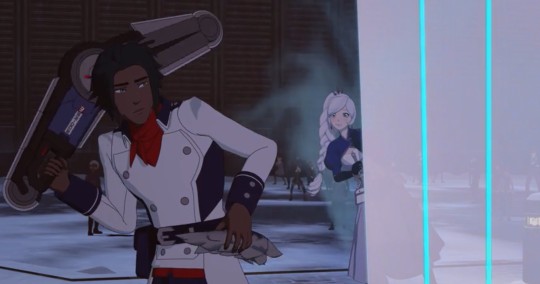

During all this we get a nice moment where Weiss saves Marrow with her knight. Love new team-ups like that! Too bad Blake and Yang are still attached at the hip. Will they ever be allowed to be girlfriends while also maintaining other relationships? Who knows.

We also see Nora dealing with the above mentioned angry mob and the only reason she’s not put into the position of defending herself against civilians is because Ironwood and Robyn conveniently pop up on the screen to make their announcement.
Okay... Here we go.
I’m going to be honest with you readers. I don’t even know how to write about all this. It’s just a colossal mess and my thoughts are so scattered I haven’t even figured out how to pull them together yet, let alone start expressing them to an audience. So I apologize that this recap is a mess all its own. However, I can at least start with this.
Ironwood didn’t tell them about Salem’s immortality.
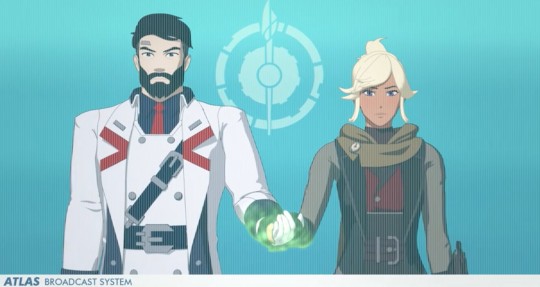
That’s the crux of EVERYTHING here. I could point out how astoundingly stupid it is to tell the people this while they are currently being attacked by grimm and how, again, the only reason why that didn’t result in his people’s massacre is because the writing is straight up inconsistent about when grimm are a threat. I could spend this whole recap criticizing this moment---another moment---where we see Ruby smiling over the horrible situation she’s helped create, the story painting her as a perfect hero. I could also talk in-depth about how flawed Ironwood’s logic is. Salem inciting hatred has never and will never be the problem. What, does he think that with a common enemy the racists will suddenly open their doors to the faunus? Or that the bandit attacks will stop? That people like Jacques will suddenly start loving everyone who can’t give them more money? I’ve gotten a lot of asks over the last year regarding real life issues, asking me how we solve these horrendous problems. My answer is always the same: there is no simple solution. There is no one, convenient thing that we can implement and then bam, racism, sexism, ableism, etc. is solved forever and always. It takes generations of slow, methodical, one-step-forward-two-steps-back work in order to enact change, the precise sort of work that Ozpin was doing in the form of schooling and advocating for tolerance across Remanant. Ironwood, meanwhile, has given the people that band-aid solution. Salem is the reason we’re divided. Salem is the reason why we’re in danger. Don’t think about our own prejudices or the separate threat of the grimm. Just come together against her and it’ll all be fine, I swear.
Which may have been a decent way of getting people to defeat Salem---we’ll tackle the other issues later---if Salem could be defeated.
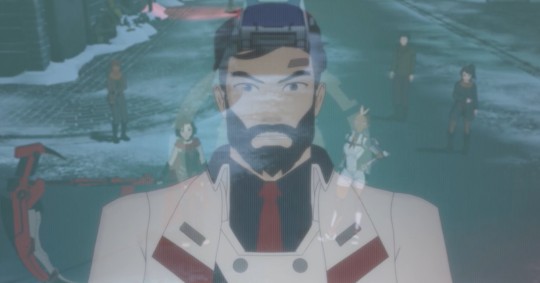
Everyone realizes this is just a massive version of what Ozpin did, right? Please tell me people get that. Ozpin had a small group of people, told them about Salem, they logically worked under the assumption that they could beat her, and when her immortality was revealed he was condemned for that supposed manipulation. You sent us to fight a war we couldn’t win. How dare you?
Now Ironwood has done the same thing, but dramatically increased the number of people involved. They find out about Salem, they’re encouraged via no corrections to believe that she’s beatable, and thus this city is preparing for a war that many would view as unwinnable if they had all the information. Every one of our leaders has manipulated in this manner now. Ozpin did it, Ruby perpetuated it, and now here Ironwood is doing it again. Except that, again, given the more specific context of each scenario... I still think Ozpin was the most justified. He never wanted the group involved. Rather, they insisted they be a part of things. The group at least are all made up of skilled fighters, not everyday civilians. Telling willing huntsmen in training that they need to “take care of” Salem with the hope that they’ll continue the work of keeping her at bay is not the same thing as letting Ironwood take resources from Mantle for a doomed plan, or Ironwood telling a city of mostly defenseless people that it’s their responsibility to help him deal with this threat. This is who he is calling to action:

Not skilled volunteers, but terrified people unwittingly drawn into the situation, and the only reason why their terror hasn’t taken over is because they’re allowed to function under the assumption that Salem can be killed. I’m all for stories where the “useless,” non-combat characters help turn the tide (it’s one of the reasons why I love Pacific Rim so much), but that scenario only works when there’s a clear end in sight; when sacrificing this peace is worth it because banding everyone together will actually lead to victory. But that’s not the case here. All Ironwood has done is set up a situation where the people, like that council member last volume, are going to start asking, “Do you think he can win against Salem? He has to. He’s our only hope. So why hasn’t he beaten her yet? Why aren’t you doing something, Ironwood?” It’s going to be this moment right here on a massive scale.

A mob of angry people closing in on an innocent, demanding to know why Ironwood isn’t fixing a problem. What the hell is Ironwood going to do now that he’s set up an expectation he can’t fulfill? More importantly, why would he do that in the first place? I really hate how stupid RWBY has made its characters, shooting themselves in the foot in the name of “Well, secret keeping is bad.” It’s not a setup I agree with, but I could at least stomach it if everyone was on the same page regarding where they place blame. However, once again we see how Ozpin is the only one who got heat for these choices.
Everyone remember Yang’s fury over, “How could you not tell us this?” That wasn’t so long ago, folks. So why isn’t she gunning for Ironwood the second he makes his announcement? How could you tell Mantle about Salem but not that she’s immortal, the exact thing Ozpin did to us and we screamed at/physically assaulted him for? Or, more realistically considering that Yang doesn’t seem to know Ironwood has been informed about the immortality yet, why isn’t she gunning for her sister? How could you put Ironwood in the position where he does to an entire city what Ozpin did to us? This is what I keep talking about in regards to the hypocrisy. The group is endlessly furious at Ozpin for his choices, but when they make those same choices, or others make those same choices… nothing. No reaction. Or the reaction is praise. Why the hell does Ruby look like this

while watching Ironwood put an entire city into the position she was in during Volume 6? It’s the same thing! Either the city of Mantle is duped into fighting an impossible war without all the pertinent information---the thing that the fandom has raked Ozpin over the coals for supposedly doing to the group---or they’re told about the immortality later and you’re faced with all the same dangers. Who’s going to attack innocents in their fear and anger? Who’s going to dive back into their addictions? Who’s going to give up completely? Who is going to join Salem? “He’s doing it,” Ruby whispers even though hypocrisy remains the name of the game and “doing it” achieves nothing. Seriously, what did Ironwood accomplish here besides briefly emboldening his people? He could have done that through teaming up with Robyn alone. All revealing Salem has done is set up a host of new problems and put an entire city into the position the group thinks Ozpin is morally horrific for putting them in. “Telling us about Salem but not that she’s immortal is Bad” was the emotional center of Volume 6, but now suddenly it doesn’t matter anymore? Would the writing please acknowledge the double standards here?

Especially given how many secrets still remain. In the last few hours I’ve seen multiple posts with fans writing about how happy they are that everything is coming to light when... it’s not. This is by no means a clean slate, devoid of secret keeping. In fact, you need a list to keep track of who knows what right now:
Yang: Knows that her mother is the Spring Maiden
Weiss: Knows that her sister is set to become the next Winter Maiden
Blake and Yang: Know that they told Robyn about the Amity secret
Ruby and Oscar: Know that Ironwood now knows about Salem’s immortality. The rest of the group presumably doesn’t know they told him
Ironwood: Knows about Salem and her immortality but (potentially) not that the relic still has a question, it draws grimm, or the real reason why Ozpin left. Those secrets weren’t acknowledged either way
Robyn: Knows about Salem but not her immortality. Presumably does not know about the relics, the Maidens, etc.
Mantle: Knows about Salem but not the fact that they can’t beat her
At this point I’m just a broken record and I do apologize for that, but what else is there to say when RWBY keeps making the same mistakes every episode? More sloppy setups, more hypocrisy, more picking and choosing when there will be consequences for actions, or when characters will get angry, or even when realism applies. It says a lot about a story that I’m wincing over a shot of our supposed hero smiling and actively agreeing with the villain. Watts is 100% right when he said that “Our tin soldier’s heart has cost him his head.”
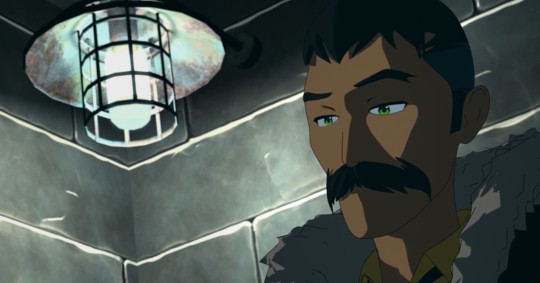
And we’ve still got half an episode of nonsense left. I’m just going to power through the rest of this.
Hated Jaune’s ridiculous “line up!” moment. That just read as so stupid to me. I get that other people loved it but it just didn’t work on my end. There are better ways to demonstrate growth than having him learn the (oh so difficult?) skill of giving an order via treating adults like five-year-olds.
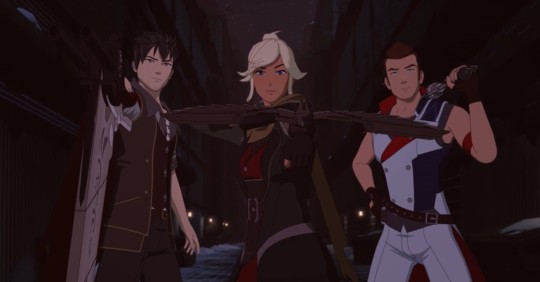
Tyrian goes off to cause more chaos in the form of trying to murder Robyn, only to find that Clover and Qrow are there to back her up. I liked Qrow’s little line about getting a crack at him first because yeah, for him this fight is personal. Last time they met Qrow nearly succumbed to his poison and Ruby was nearly kidnapped. He deserves to get in any killing blows if Tyrian is set to die this volume.

We learn that Neo is off to try and steal the lamp from the “farm boy” and oh yeah, wouldn’t it have been great if there was a way to avoid this whole scenario? If the group had, just maybe, put the relic into the vault like they’d intended to do from the start? Or at least give us a good reason for carrying it out in public, at the Schnee mansion of all places. RWBY is chock-full of the most contrived situations I’ve ever seen, relying entirely on random bouts of stupidity for them to “make sense.” No one thinks twice against carrying around their most precious object in a city they know has been infiltrated by Salem’s men. Ironwood starts talking about his secrets in front of the people he’s keeping secrets from. Is it really that hard to come up with scenarios that don’t rely on our heroes randomly losing a large number of brain cells?
Meanwhile, Cinder is going after the Winter Maiden and will no doubt find that Winter is guarding her. Back at the fight, Ruby tries to use her silver eyes but is too distracted. That at least is a limitation on her power, even if it doesn’t make much sense that she’d be more distracted now than when she had a leviathan grimm bearing down on her.
Penny takes a massive hit and for a brief moment I thought, “Here! Ten episodes in and we’ll finally see Ruby have some reaction to Penny’s resurrection. After all, seeing her friend lying on the ground like that is going to trigger some pretty traumatic memories.” But no. Penny pops up with an “Ouch!” and it’s once again just another joke.

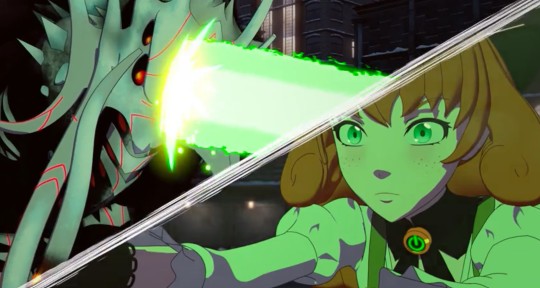
I did like them using the grimm’s own tusk to take it down though. That was a good and visually interesting plan. We also get to see Penny as the darling of Mantle again, including Robyn complimenting her over the comms. So again, what was the point of framing her, either from the villain’s or the story’s perspective? Who knows. We’re not given a reason. It’s just a thing that happened that, like always, led to no consequences.
Watts walks into his trap, reveals that he has control over the arena, pulls out his gun, and Ironwood absolutely roasts him with, “You always were a pain in the ass.” Highlight of the episode. Everything else remains a chore to watch.
Three more episodes. Just three more and we can put this mess of a volume behind us. Or at least I can.
Until next Saturday 💚
62 notes
·
View notes